
SCHOOL OF NURSING, MIDWIFERY AND SOCIAL WORK
Master of Counselling
Practice Education Manual
2022
COUNSELLING PRACTICUM
COUN7020 / COUN7021

2
TABLE OF CONTENTS
WELCOME ............................................................................................................................................................................ 3
STAFF CONTACT DETAILS ................................................................................................................................................. 4
ROLE OF UNIVERSITY-BASED STAFF .............................................................................................................................. 5
Principal Practice Educator (Placement Officer, Counselling) ......................................................................................... 5
Course Coordinator COUN7020 / COUN7021 ................................................................................................................ 5
Program Lead Master of Counselling .............................................................................................................................. 5
Principal Practice Educators (UQ External Supervisors) ................................................................................................. 5
ROLE OF AGENCY SUPERVISOR ...................................................................................................................................... 6
PLACEMENT PROCESS ...................................................................................................................................................... 7
Planning ........................................................................................................................................................................... 7
First Week of Placement (before working with clients) ..................................................................................................... 7
During Placement ............................................................................................................................................................ 7
Placement Review Meeting .............................................................................................................................................. 8
Toward the End of Your First Semester of Placement ...................................................................................................... 8
Completion of the Placement (COUN7020 / COUN7021) ................................................................................................ 9
Fitness to Practise ........................................................................................................................................................... 9
Students at Risk Guidelines ........................................................................................................................................... 10
Professional Performance Areas. .................................................................................................................................. 11
At Risk Procedures flowchart ......................................................................................................................................... 13
ATTENDANCE .................................................................................................................................................................... 14
Attendance at Placement ............................................................................................................................................... 14
Attendance at University Workshops .............................................................................................................................. 15
Public Holidays ............................................................................................................................................................... 15
Student Illness During Placement ................................................................................................................................... 15
Transport ........................................................................................................................................................................ 15
LEARNING ON PLACEMENT ............................................................................................................................................. 16
Supervision .................................................................................................................................................................... 16
The Supervision Contract ............................................................................................................................................... 17
Emphasis on Reflective Learning and Your Learning Journal ........................................................................................ 17
Research Project ............................................................................................................................................................ 18
DIFFICULTIES IN PLACEMENT ......................................................................................................................................... 19
Dispute Resolution ......................................................................................................................................................... 19
Termination of Placement ............................................................................................................................................... 20
SUPPORT FOR STUDENTS .............................................................................................................................................. 21
Student Services ............................................................................................................................................................ 21
Disability ......................................................................................................................................................................... 21
Discrimination ................................................................................................................................................................. 21
Harassment .................................................................................................................................................................... 22
Right to Information ........................................................................................................................................................ 22
RISK MANAGEMENT AND INSURANCE .......................................................................................................................... 23
Risk Management .......................................................................................................................................................... 23
Personal Safety on Placement ....................................................................................................................................... 23
Security Checks ............................................................................................................................................................. 23
Working with Children (Blue Card) ................................................................................................................................. 23
Student Insurance .......................................................................................................................................................... 24
Public Liability Insurance ............................................................................................................................................... 24
Personal Accident Insurance ......................................................................................................................................... 25
Student Travel Insurance ............................................................................................................................................... 25
Incident Reporting .......................................................................................................................................................... 25
GENERAL INFORMATION ................................................................................................................................................. 26
UQ Policies and Procedures Library (PPL) .................................................................................................................... 26
Plagiarism ...................................................................................................................................................................... 26
Confidentiality ................................................................................................................................................................ 26
Professional Organisations, Accreditation and Registration .......................................................................................... 27
APPENDICES ..................................................................................................................................................................... 29

3
WELCOME
Dear Student
Welcome to the practicum courses within the Master of Counselling Program in the School of Nursing,
Midwifery and Social Work and the School of Psychology within the Faculty of Health and Behavioural Sciences at
The University of Queensland.
The field placement in Counselling is designed to provide students with “hands-on” experience in working with
people who are facing a range of difficulties and personal issues. You will be offered direct exposure to the
practice of professionals in day to day therapeutic work and opportunities for you to extend your knowledge and
understanding of counselling within an agency offering counselling and other social and emotional therapeutic
support to clients. It is expected that you will take this opportunity to develop a professional counselling persona
in the workplace by working collaboratively with your colleagues in the agency and learning as much as you can
from more experienced professionals.
The opportunity to work with people who are being offered professional therapeutic help enables you to begin to
proactively link your current counselling practice more pertinently to theory. Where you find your knowledge,
understanding or skills lacking, you will have the opportunity to seek advice, research and read appropriately to
become a more fully functioning reflective practitioner. Making best use of regular professional supervision will help
you to build a strong theoretical base and will include opportunities for your own personal development. The
formation, development and refinement of a personal framework for practice, and the integration of this with
theory and research will be the focus of your studies during this experience.
May I take this opportunity to wish you a great learning experience.
Warm regards
Denis O’Hara
Dr Denis O’Hara
Program Lead, Master of Counselling
School of Nursing, Midwifery and Social Work
Chamberlain Building (Room 320)
The University of Queensland
Brisbane QLD 4072
Australia
T: +61 (7) 3365 2834
E:
denis.ohara@uq.edu.au
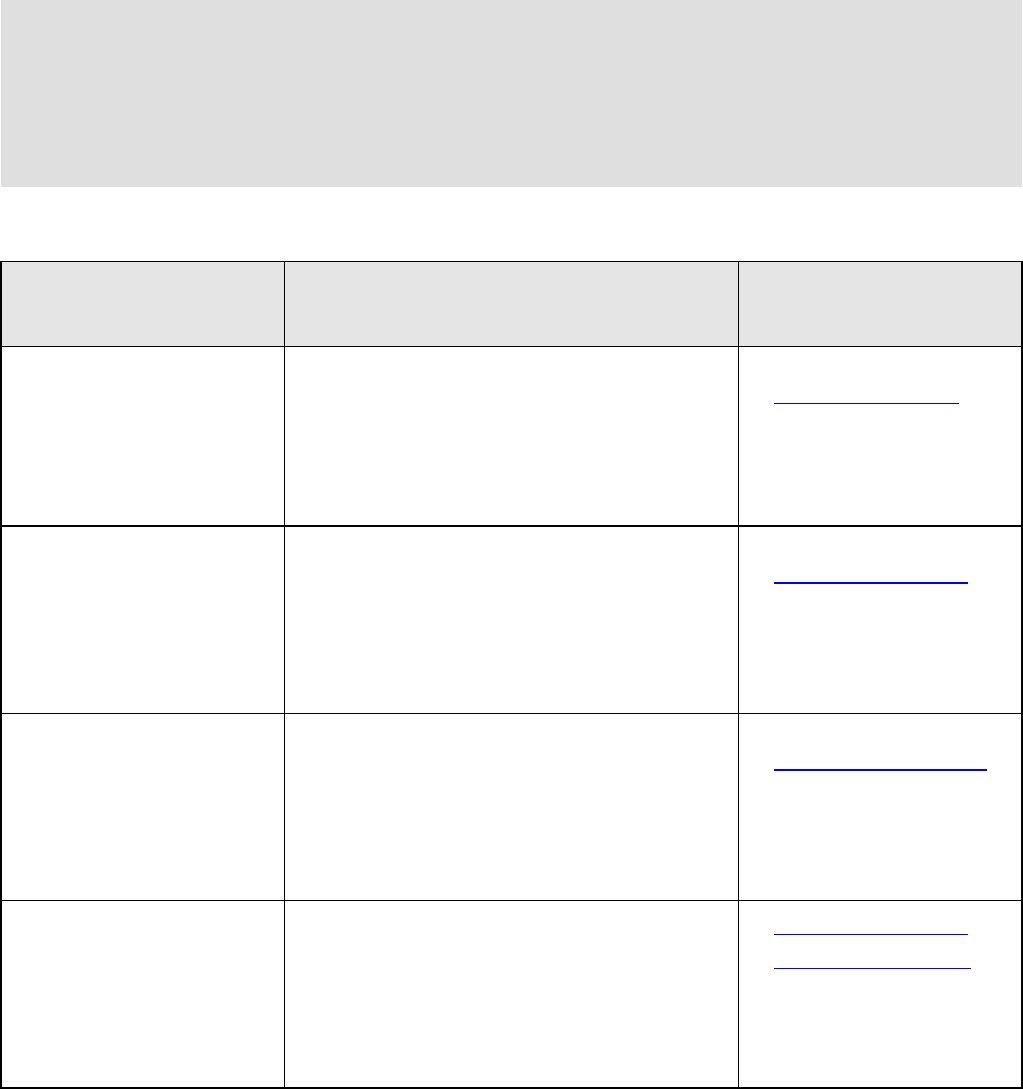
4
STAFF CONTACT DETAILS
Name Role Contact Details
Ms Naomi Hansar Principal Practice Educator (Placement
Officer)
Master of Counselling Program
(School of Nursing, Midwifery and Social Work)
All questions or concerns regarding your
placement should be directed to Naomi.
T: +61 (7) 3365 2741
Mr Jim Schirmer
Course Coordinator
Master of Counselling Program
(School of Nursing, Midwifery and Social Work)
Questions about the academic components of
COUN7020 / COUN7021 should be directed to
Jim.
T: +61 (7) 3346 7026
Dr Denis O’Hara
Program Lead
Master of Counselling Program
(School of Nursing, Midwifery and Social Work)
T: +61 (7) 33652834
E: denis.ohara@uq.edu.au
Ms Monique Cairney
Mr Michael Ellwood
Principal Practice Educators (providing UQ
external supervision)
Master of Counselling Program
(School of Nursing, Midwifery and Social Work)

5
ROLE OF UNIVERSITY-BASED STAFF
Principal Practice Educator (Placement Officer, Counselling)
Provide support for students seeking placements including fielding student enquiries about placements
and following up on pre-placement requirements.
Coordinate and develop links with placement agencies including keeping up to date records of contact
details, informing agencies of current requirements of the practicum course, and seeking out new agency
links.
Liaise with students and agencies to link up potential placement opportunities, and provide follow up
support for students in regard to the outcomes of pre-placement interviews with agencies.
Provide ongoing liaison between students, agencies and the University including arranging and
facilitating placement review meetings, and contacting agency supervisors by email and phone to
check that placements are on track.
Liaise with the Agency Supervisor, Course Coordinator and Program Lead to identify and address issues
in the placement so that a plan of action can be formulated about how to address the concerns.
Course Coordinator COUN7020 / COUN7021
Coordination and delivery of the University based learning and teaching elements of the course,
including facilitation of the COUN7020 / COUN7021 workshops and the assessment of assignments.
Management of placement issues. Provision of support and mediation for students and agency staff, and
remediation for students as necessary with verbal and written feedback to the student and his/her
supervisor during this process.
Program Lead Master of Counselling
Overall responsibility for and coordination of the Master of Counselling program.
Placement issues as referred by the Course Coordinator and Placement Officer.
Remain cognisant of all participants’ needs and rights in the practicum experience in all decision
making including: students, students’ clients, employees of agencies, agency supervisor, the School
of Nursing, Midwifery and Social Work, the School of Psychology and other related professionals with
whom the students come into contact in the work.
Principal Practice Educators (UQ External Supervisors)
Role is similar to Agency Supervisors (see p.6). Students may be allocated a UQ external supervisor if
their agency does not have capacity to provide the required supervision on-site.

6
ROLE OF AGENCY SUPERVISOR
Provide contractually based and agreed supervision on a regular basis that the supervisee is able to take part
in willingly, typically in a ratio of 1 hour of supervision for every 4 hours of client contact (see Appendix 5 for
details of the supervision contract).
Provide regular feedback to students about their practice, including observation of at least one session using
the Core Skills Competency Checklist (see Appendix 7).
Liaise with the Placement Officer and the Program Lead if any concerns arise about a student’s practicum
experience.
Contribute to the assessment process in conjunction with the Academic staff in the University by providing
formative and summative evaluation throughout the placement (see Appendix 8 and Appendix 10A).
Note: A checklist is provided (Appendix 3) which may be useful in identifying specific tasks for the first week of
placement, during placement, and towards the end of placement.

7
PLACEMENT PROCESS
Planning
Ensure all pre-placement requirements are completed to be eligible to start placement. In particular, your
Blue Card and immunisations, including COVID-19 vaccination must be verified (see Appendix 1).
Do you need a security check (see Security Checks in the Risk Management and Insurance section)?
Note: The following must be completed so that you are covered by the University’s insurance (see the
Student Insurance section).
• Complete the University’s online risk assessment process – the HaBS Placement Safety Modules – in
Blackboard (see also Risk Assessment in the Risk Management and Insurance section).
• Submit the Student Declaration form (see Appendix 2) to the Placement Officer.
• Enrol in COUN7020 OR COUN7021 on mySI-net
(you will need to be permission-listed for your
placement course) and notify the Placement Officer of your scheduled commencement date.
• Attend the COUN7020 / COUN7021 Placement Orientation Workshop (check your email for dates).
First Week of Placement (before working with clients)
Read and make notes on the Learning Agreement discussion points (see Appendix 4) to be discussed in
your first meeting with your Agency Supervisor.
Complete your Supervision Contract (Appendix 5) in negotiation with your supervisor. Keep one
copy to refer to during the supervisory relationship and submit an electronic copy to the Course
Coordinator via Turnitin by the due date in the Electronic Course Profile.
Become familiar with the placement agency or organisation occupational health and safety procedures
(this is in addition to the University’s requirements above).
Become familiar with the relevant professional codes associated with your practicum placement, for
example the Australian Counselling Association (ACA) Code of Ethics or the
Psychotherapy and
Counselling Federation of Australia (PACFA) Code of Ethics.
During Placement
Maintain a full and accurate log of all your activities on placement (see Appendix 10C) and ask your
supervisor to sign this on a regular basis, for example during supervision sessions. It is your responsibility
to ensure this is done on a regular basis (see
Appendix 12 for definitions of client contact, non-contact
and supervision hours).
Keep your learning journal on a regular, preferably daily basis (see Appendix 13). This is essential for
completing the reflective component of your final practicum project report. The learning journal may also be
referred to at the COUN7020 / COUN7021 workshops, and sighted during the placement review meeting
or by your supervisor when they do your evaluation.

8
Ensure your supervisor has observed at least one session of you as a counsellor and has completed
the Core Skills Competency Checklist (see Appendix 7). Submit a copy to the Course Coordinator by
the due date in the Electronic Course Profile.
Prepare case notes/correspondence/reports in accordance with agency policies (see Appendix 14 and
Appendix 15). Ensure any notes of clients you work with, or observe, are de-identified (see the section
on Confidentiality within General Information). Remember that case-notes can be subpoenaed, so
maintaining complete and accurate records is essential.
COUN7020 only: Early in the semester meet with the course coordinator to discuss your project and
its implementation. The course coordinator will provide opportunities for students to meet, as well as
information and support for students in determining a research question, choosing methodology
and guidance with implementation.
Make a note of potential reading and research subject matter as and when this arises. Read and
make notes on your reading on a regular basis to inform your knowledge, understanding and to
develop your skills as a reflective practitioner.
Attend the COUN7020 / COUN7021 workshops at UQ to inform and develop your knowledge,
understanding and skills in counselling theory, practice and research (see the ECP for dates/details).
Note: You may wish to utilise recordings of sessions to critically review your counselling practice. Before
recording client sessions, you must check your agency’s policies to determine if this is permissible.
You must also gain explicit consent from clients to use any recording for educational purposes (see
Appendix 16). Please also refer to the guidelines on Confidentiality in the General Information section.
Placement Review Meeting
A placement review meeting facilitated by the Placement Officer is typically arranged around week 6 of the
first semester of placement (see Appendix 6).
This meeting usually takes about an hour, and provides opportunities for students and agency supervisors
to review the placement, to reflect on students’ progress, raise any concerns and issues, and to review
goals for further learning.
During the meeting, your learning journal (see Appendix 13) may be sighted by the Placement Officer and
you will have an opportunity to discuss your progress with this.
Note: More than one placement review meeting may occur if there are particular issues that arise during the
placement and the student and/or agency supervisor request them.
Toward the End of Your First Semester of Placement
Jointly complete the Formative Supervisor Evaluation of Student Practice form (see Appendix 8) with
your supervisor. Note that this is a formative evaluation and does not require your supervisor to
recommend a pass/fail. Submit an electronic copy to the Course Coordinator via Turnitin by the due
date in the Electronic Course Profile (ECP).
COUN7020 only: Submit your Research Project Plan (see Appendix 9) by the due date specified in the
relevant Electronic Course Profile (ECP) via Turnitin.
If you are changing your placement agency from Semester 1 to Semester 2:
• Complete your log book(s) and ensure you get your supervisor to sign these off.
• Undertake a final placement review with your supervisor. In this instance, your supervisor should
complete the Formative Evaluation (Appendix 8), rather than the Summative Evaluation (Appendix 10A).
• Complete the Student Evaluation of Placement (Appendix 10B).
• Submit all of these to Turnitin.
• See the section below on Completion of the Placement for notes on finishing client work.
IMPORTANT: To meet the needs of your clients and agency, as well as your own learning, most students

9
will continue placement hours through the mid-year break. Please let the P lacement Officer know of any
breaks or leave you are planning to take. Note that you need to be enrolled in COUN7020 / COUN7021 in
order to be covered by the University’s insurance policies whilst on placement. If you are working
through the mid-year break, make sure that you are enrolled in COUN7020 / COUN7021 for Semester 2.
Completion of the Placement (COUN7020 / COUN7021)
As your placement comes to an end, consider how you will “wind-down” your practice. Make sure
that endings with clients are well thought through and your clients are prepared for your departure.
Abrupt endings can be harmful to clients who have already experienced losses in the past over which
they have had little control. Consider asking your client how they would like to end your relationship
together and discuss endings with your supervisor well in advance.
Ensure you have completed all the forms required for your final Practicum Report Portfolio (Assignment
2, see Appendix 10) including:
• Summative Supervisor Evaluation of Student Practice (see Appendix 10A).
• Student Evaluation of Agency (see Appendix 10B).
• Log of hours signed by your supervisor (see Appendix 10C).
Submit an electronic copy of your final Practicum Report Portfolio to the Course Coordinator via
Turnitin by the due date specified in the COUN7020 / COUN7021 Electronic Course Profile (ECP).
Fitness to Practise
The University of Queensland (UQ) through the Master of Counselling program has a responsibility to our
professional organisations and more importantly, to the people in the community for whom we care, to
graduate practitioners who have skills, behaviours and attitudes that equip them to work responsibly,
competently and respectfully as counsellors within Australia. As such we are charged with the responsibility
to ensure that students are fit to practise.
The Fitness to Practise Policy and Procedures (PPL 3.30.14)
are designed primarily as protection for all
from practice that may be harmful to clients, colleagues, co-workers and/or the student alike.
What does it mean being ‘Fit to Practise’?
A student needs to show that he or she is able to meet the standards that are expected of a person who is fit
to work as a counsellor. The UQ policy states that the policy and procedures has been developed to:
guide the management of cases where a student undertaking a program that has a practical placement
component has exhibited behaviour that has given cause for concern as to their Fitness to Practise in
that program. (Section 1.4 Policy)
Being fit to practise is considered in terms of a range of factors that according to the policy include:
a) Engaging in conduct outside the bounds of that considered acceptable or worthy of the membership
of the profession (conduct); and/or
b) Demonstrating performance that is not consistent with the profession’s established standards
(performance); and/or
c) Exhibiting disregard for, or are unable to meet, the rules, regulations or standards for practising as a
member of the profession or for undertaking professional practice with a professional practice
provider (compliance); and/or
d) Displaying a disability or health condition that impairs their capacity to practise as required by the
profession (disability or health). (Section 4.3 Policy)
Who can report Fitness to Practise concerns?
There may be a number of sources who may report concerns about a student’s fitness to practise. These are
known as stakeholders, both internal and external. They may include, but are not necessarily limited to:
placement supervisors, university placement officers, academic staff, professional staff, clients via a
supervisor, or other students via university staff.

10
What happens if Fitness to Practise concerns are noted with regards to a particular student?
If a Fitness to Practise incident or series of behaviours are reported, it is normally done so in writing.
(Programs run through the School of Nursing Midwifery and Social Work including the Master of Counselling
program offer a form on which incidents can be noted. Please contact the Placement Officer in the first
instance and for a copy of the form).
The concern is directed to the Head of School of Nursing Midwifery and Social Work who assigns an
Investigating Officer to review the concern seeking input from all relevant sources and through gaining all
relevant documentation. The affected student will be given an opportunity to respond to the Investigating
Officer. In the situation of a serious issue, the placement may be suspended during the investigation.
Students have the right to have any concerns about them dealt with promptly, to be informed of such
proceedings, and to be able to respond to such concerns.
What outcomes may occur with Fitness to Practise concerns?
In terms of investigation and outcomes, Fitness to Practise concerns can be categorised as:
• Developmental Intervention. These concerns are considered temporary, one-off or infrequent, minor
and able to be remediated short-term. If an issue is deemed to be developmental, the student will be
supported with supervision/supportive care/education/training to remediate issues.
• Level 1. These are considered frequent, accidental, thoughtless or unintentional, minor and able to
be remediated short-term. If a Level 1 concern is determined, various outcomes may occur from no
further action taken to a written warning to assessment implications or support referrals.
• Level 2. These are considered permanent, persistent, repeated or escalating, clear in intent, serious
and unlikely to be remediated short-term. If a Level 2 concern is noted, outcomes may involve such
measures as imposing conditions on the student, refusal to allow enrolment in further placements or
assessment penalties. (Section 8.2 Procedure)
If a complaint is considered as one of misconduct, the case will be investigated in accordance with the
Student
Integrity and Misconduct Policy and Procedures (PPL3.60.4) and ceases to be looked at under Fitness for
Practise policy.
The University has the right to inform subsequent placement supervisors/organisations of previous Fitness
to Practise concerns for a student. This would be done as a means of ensuring students who may be
struggling in their practice gain any necessary support/supervision to ensure the students remain fit to
practise and/or to protect the needs of vulnerable clients and staff of the placement organisation.
A Fitness to Practise decision and outcome can be appealed by students within 20 working days of the notice
of the outcome.
Full details of the Fitness to Practise policy and Procedures can be found at
https://ppl.app.uq.edu.au/content/3.30.14-fitness-practise.
Students at Risk Guidelines
As discussed above, Fitness to Practise procedures have been put in place to support students, clients and
supervisors in ensuring students becoming safe practitioners who exhibit professional behaviours that are
considered appropriate both at the University and while on practical placements.
As the spirit of the Fitness to Practise policy is to balance remediation and rehabilitation of unacceptable
practise, it is important to ensure the early identification of issues which may lead to concerns and implement
intervention strategies (remediation) to assist you as students to attain acceptable standards in all aspects of
your practice. It is hoped that through early identification, referral of students for Fitness to Practise and the
ensuing repercussions can be averted.
As a result the Master of Counselling program has developed processes to provide a clear intermediate
stage for addressing student difficulties in practicum before engaging The University of Queensland Fitness
to Practice policy as outlined in Policy 3.30.14 Fitness to Practise
http://ppl.app.uq.edu.au/content/3.30.14-
fitness-practise.
Specifically, these guidelines are utilised when your supervisor or academic/professional staff determines
that you may be at risk of failing an assessment component of a placement, including but not limited to: a
mid or end-point evaluation on placement, or when significant and repeated issues have been raised about
your performance on placement. These guidelines seek to address issues of competence and concerns
relating to client and public safety. Where possible, academic performance will be managed using the
relevant University Rules and Policies.

11
Student At Risk Guidelines relevant to you as a student are detailed for you below:
Where concerns regarding your fitness to practice are identified, the following process shall ensue:
1. The originator of the concern in conjunction with your supervisor (if not your supervisor him or herself)
will complete a Cause for Concern Report. This form is designed to provide an opportunity to clearly
identify the nature of the concern and the details surrounding this. The supervisor (or the originator of
the concern in collaboration with the supervisor) is encouraged to discuss his or her concerns directly
with you where appropriate at the time of the issue arising. Where possible and reasonable, you may
provide your written comments to the report and sign the form also.
2. If the concerns have not been resolved in Step 1, the supervisor will contact the Placement Officer and
outline his or her concerns regarding your performance and ability to pass the relevant evaluation. If
the originator of the complaint is not your supervisor, then the concerns will be discussed with your
current supervisor.
3. The Placement Officer and Supervisor will then meet with the COUN7020 / COUN7021 Course
Coordinator and/or the Program Lead of the Master of Counselling Program to discuss the concerns
and specify the criteria on which the risk is being identified in terms of quality and severity and
determine the potential for remediation.
4. Following this meeting in Step 3, the Placements Officer and the COUN7020 / COUN7021 Course
Coordinator and/or the Program Lead will meet with you to discuss the concerns raised and agree to
a learning plan outlining the remediation needs and required supports. Examples may include
intensive training as identified and specified. The learning plan should also detail how it will be agreed
that you have met the remediation requirements identified as well as a time line for remediation
processes and review.
5. At an agreed upon date for review, the learning plan will be reviewed by relevant parties. If remediation
goals have been satisfactorily met, the issue is deemed to be resolved. If concerns still exist, then the
Placement Officer and the COUN7020 / COUN7021 Course Coordinator and/or the Program Lead will
initiate the procedures of Fitness to Practice Policy of The University of Queensland.
Professional Performance Areas.
These may include, but are not limited to, the examples listed in the box below:
Professional Performance Areas
1. Honesty and Integrity
• Refrains from making statements that are false, misleading or deceptive
• Earns the respect of others
• Puts truth before personal advantage
• Records and reports incidents and facts accurately
• Recognises and declares potential or actual conflicts of interest
2. Professional and ethical conduct
• Behaves in an equitable manner towards all and respects cultural, individual and role
differences irrespective of age, gender, race, ethnicity, religion, sexual orientation, disability,
language and socioeconomic status
• Avoids inappropriate relationships in both professional and personal settings
• Behaves in a manner that acknowledges the fundamental rights, dignity and worth of others
• Maintains professional standards and avoids behaviour that is likely to damage, or bring into
disrepute, the profession of psychology
• Upholds client privacy and maintains client confidentiality
• Recognises obligations and limitations under the law
3. Interpersonal Skill and Communication
• Exhibits empathy as demonstrated by direct observation of interactions or evidenced by
feedback from clients, other professionals and the public
• Strives to understand the needs of others and is able to consider the perspective of all other
parties involved in professional interactions
• Displays the ability to communicate clearly, considerately and sensitively with clients, their
families, other health professionals, faculty staff and the general public, including with
people from diverse backgrounds and in cross-cultural settings

12
• Exhibits interpersonal characteristics that enhance her or his ability to work with clients and
interact professionally with others
• Displays a level of counselling ability consistent with minimum competency for stage of
training
4. Emotional stability and Well-being
• Demonstrates the cognitive and sensory capacities needed to interact effectively and
professionally with clients, students, other professionals, the public and faculty staff
• Demonstrates appropriate self-control (e.g. anger control, impulse control) in interactions
with clients, peers, students, other professionals, the public and faculty staff
5. Responsibility and Reliability
• Follows professionally recognised problem-solving processes (such as addressing any
issue that may arise in the first instance with the individual(s) involved with the problem)
• Fulfils commitments in a reliable and timely manner, meeting agreed deadlines and
undertaking all duties
• Demonstrates punctuality and is not late or absent without appropriate justification
• Demonstrates a commitment to a process of continuous learning
• Demonstrates an appreciation of, and respect for, the roles of all health care professionals
and the value of teamwork within professional setting
6. Self-awareness, Self-reflection and Self-evaluation
• Recognises own abilities and limitations and demonstrates an ability to admit to error and
manage remedial processes
• Demonstrates appropriate levels of self-assurance, confidence and trust in his or her own
abilities
• Exhibits awareness of own belief systems, values, needs and limitations and the potential
effects of these on her or his work
• Recognises the need for appropriate mental and physical heath and seeks help where
necessary
7. Relationship development and management
• Recognises and respects diversity and demonstrates ability to engage respectfully and
effectively with others irrespective of cultural, individual and role differences
• Demonstrates interpersonal skills necessary to interact effectively and professionally with
clients, students, other professionals, the public and faculty staff.
• Demonstrates interpersonal skills necessary to enhance professional relationships with
peers, other professionals and faculty staff.
• Demonstrates openness to the process of supervision and a willingness to receive and use
feedback to enhance skills and performance
• Demonstrates sensitivity
8. Professional Competence in Counselling
• Demonstrates appropriate knowledge of the discipline
• Applies knowledge to practice
• Demonstrates skills necessary for assessment, planning and intervention

13
At Risk Procedures flowchart
Step 1. Placement concerns / critical
incident noted by supervisor or
originator of concern
Placement Officer
Student review of
report where
appropriate
If not already involved, alert
COUN7020/7021 Course
Coordinator
Step 3. Set up meeting with Course
Coordinator and/or Program Lead,
Supervisor and Placement Officer
Supervisor discusses
concerns with student
Supervisor completes Cause for
Concern Report form(s)
Alert Program Lead if
necessary
Introduce remediation strategy
(Practice Learning Plan)
Step 4. Set up meeting with Course
Coordinator and/or Program Lead,
student and Placement Manager
Formalise Practice Learning Plan &
disseminate to relevant parties
Step 5. Review Practice Learning Plan
and agreed upon outcomes
Issue resolved
Issue unresolved / recurs – initiate
Fitness to Practise Policy
Issue resolved.
No further
action required
Step 2. Issue unresolved / recurs –
Supervisor alerts Placement Officer

14
ATTENDANCE
Attendance at Placement
You are expected to attend the placement agency/agencies for a minimum of 52 days in total during the two
13-week blocks of the placement course COUN7020 / COUN7021.
Attendance is usually 2 full days (minimum of 7 hours) a week for 13 weeks each semester. Students need
to complete a minimum of 182 hours of attendance in each semester. (Additional attendance hours
accumulated in the first half of placement cannot be accrued and counted towards the required hours for the
second half of placement).
Most agencies expect you to be there between 9:00am and 5:00pm. However, there will be variations in that
expectation and it is hoped that both students and agencies can be flexible about when the placement hours
can be worked.
You may from time to time engage in “out of hours work” (e.g. when running an evening group session or a
weekend workshop). You are expected to learn/adhere to the organisational structure, processes, rules, and
working conditions of your particular agency.
COUN7020 / COUN7021 is undertaken over two consecutive semesters, beginning in Semester 1 of the
placement year. Note that the course is not offered in the summer semester.
Mid-semester break between Semester 1 and Semester 2 may be 2-7 weeks in length. You will need to
negotiate with your Agency Supervisor an appropriate amount of mid-semester leave which supports the
service delivery model of the agency and considers the best interests of clients as well as your own needs.
Hours accrued during the end of semester/mid-year break can be included in the 182 hours required for the
second half of the practicum.
The minimum client contact hours required in COUN7020 / COUN7021 to graduate from the Master of
Counselling program is 60 hours, with 15 hours of supervision related to placement (a ratio of four contact
hours to one hour of supervision).
The required 60 client contact hours should be accrued over the span of both semesters, that is, you do not
need to accrue 30 hours of client contact in the first semester of placement. It is normal to have fewer contact
hours in the first semester as you build your client load.
You are expected to inform all clients of your status as a counsellor-in-training under the supervision of an
experienced supervisor. You must also inform clients that information about their cases may be discussed
with the supervisor and that the same rules of confidentiality apply.
An accurate log of all placement activities should be recorded to evidence the above requirements. The log
will be signed off by your supervisor on-site. The log of hours should be submitted to the Course Coordinator
by the end of semester (date as per the Academic Calendar).
The end date of the placement is negotiable between the student, agency and UQ. It should be mutually
agreed between the parties and should consider the following:
− Client expectations: It is important that you close relationships with clients in an appropriate way and
honour any obligations to finish programs or courses you are involved with.
− Agency expectations: Some agencies ask for a commitment of time that extends beyond the university
requirements, for example, you may be asked to start placement early and work through breaks, meaning
that you will accrue more hours than the minimum required by the university.
15
− Academic expectations: The placement is part of a full year course and is designed to be undertaken
alongside the academic components of the course ie the COUN7020 / COUN7021 workshops,
throughout the year.
IMPORTANT: If there are any difficulties in meeting these guidelines a more specific agreement needs to be
approved by the Course Coordinator and Program Lead. In the first instance, you need to email the Placement
Officer to advise of the context of your placement attendance not meeting the guidelines. A specific
agreement will need to be negotiated between the student, UQ and the organisation, and not between a
student and the organisation alone.
Attendance at University Workshops
In addition to the hours spent in the placement, students are required to attend COUN7020 / COUN7021
workshops at UQ. Refer to the ECP and Blackboard for the relevant dates.
It is expected that you will attend all mandatory workshops, including the Placement Orientation
Workshop. Students are expected to make arrangements in advance with their place of employment,
families where relevant, or any other relevant parties so that they are able to attend. Any difficulties in
attending should be discussed in correspondence with the Course Coordinator for COUN7020 / COUN7021
via email in the first instance. Registers of attendance will be kept.
Public Holidays
If a placement day falls on a public holiday you will need to negotiate with your placement to reschedule the
attendance hours to be able to accrue and log the minimum of 182 hours per semester.
Student Illness During Placement
If you are ill and unable to attend placement, please make sure you inform the agency in a timely manner
and according to their expectations ie by phone or by email.
Where a student is absent from placement due to sickness for up to two days, there is no requirement for
a medical certificate.
Absence from placement for three consecutive days requires a medical certificate. In this instance, you
are also required to notify the Placement Officer.
Within the above guidelines students are still expected to accrue and log a minimum of 182 hours per
semester. If students are concerned about taking extended sick leave while on placement, they should
contact the Placement Officer in the first instance.
Transport
Students are responsible for the cost of going to and from the agency on a daily basis during placement.
The procedures and policy concerning the student's use of transport on placement will vary depending on
the agency offering the placement. Some agencies provide a mechanism for reimbursement of student’s
travel expenses incurred in connection with performing their normal duties. Other agencies allow students to
use agency cars. It is important to be very specific about the agency requirements concerning driving agency
cars or using a private vehicle on agency business, e.g. arrangements regarding insurance and driver’s
licence requirements.
Some agencies do not have funds available for student travel costs. Arrangements for travel expenses need
to be clarified between the agency or the Placement Officer and the student. The University of Queensland
does not provide funds for travel expenses for students on placement.

16
LEARNING ON PLACEMENT
Learning and teaching on placement occurs in a wide range of ways and involves many people. It is your
responsibility to be proactive in negotiating and utilising opportunities for learning.
Supervision
Supervisors and students may spend time together in different ways – supervision of counselling
sessions carried out by the student, observation of counselling by the student, co-counselling, group
interactions, driving to meetings, having a chat in the tea room, de-briefing after something has happened
and so on. These are significant opportunities for support, guidance and learning. It is also important that
regular, uninterrupted formal supervision time is arranged. The formal supervision session is a planned
regular period of time spent together during the course of the placement. The objective of each supervision
session is to guide you through the educational requirements of placement and to facilitate your learning in
offering emotional and therapeutic support to clients.
This is facilitated by:
You having access to your work with clients (including session notes, recordings etc).
You and the supervisor providing opportunities for learning and teaching in a working relationship.
The supervisor providing support, encouragement and specific feedback to you.
Taking part in a process of accountability between your learning, the agency expectations and the
University requirements.
The supervisor and yourself jointly reviewing and mapping the educational process, ie the roles and tasks
appropriate to each phase of your learning.
The Supervision Process is facilitated by:
Having uninterrupted time for supervision.
Jointly setting and/or agreeing on an agenda for the use of available time.
Supervision may include, for example:
•
Discussion based on your prepared work.
•
Critical reasoning – asking ‘how’ and ‘why’.
•
Reflection on practice using reports prepared in advance or usefully made notes on client contact
work.
•
Modelling, eg role plays, observations of others, etc.
Ideally, each session may conclude with a small number of goals that are:
Concrete, specific and achievable.
Understood by you and your supervisor.
Relevant to your learning goals/needs.
17
Able to be evaluated when you next meet.
Challenging you to work to a higher level of competence.
It is useful for you to keep notes on each session and to review these in planning for subsequent supervision
times. These can be kept in your learning journal.
The Supervision Contract
Students and supervisors will best support their placement experience with a supervision contract (see
Appendix 5) that identifies the rights and obligations of each party.
This could include undertakings regarding what time is available, how the supervisor can be accessed, who
else can be consulted, specific agency requirements, e.g., about access to resources such as cars or
computers, protocols for chart entries, sending letters. One format for a discussion of a placement and a
resulting supervision contract is included as Appendix 4 along with suggested ideas for your discussion
with your supervisor. It is strongly recommended that such a discussion should occur very early in the
placement so each student and supervisor can clarify and negotiate how they anticipate working together
during placement.
Completed Learning Contracts are first to be sent to Course Coordinator (Jim Schirmer) for signature.
Once this is complete, these can then be uploaded onto Blackboard.
Emphasis on Reflective Learning and Your Learning Journal
A central objective of the placement course is for you to become a reflective practitioner who can
integrate knowledge and evidence-based practice, and practice-based knowledge and understanding. Use
your learning journal (see Appendix 13) to explore ideas and to reflect on your experiences. Seek out
research papers and books to build your knowledge of counselling theory, skills and counselling issues.
Include other pertinent literature such as, how to make the best use of supervision, or link your learning
on practice to recommended reading from other current or previous courses you may be studying, on
matters such as, mental health, health capacity challenges, loss, ethics, children and young people,
relationship counselling, crisis and violence. It is good practice to inform yourself about issues relevant
to your clients’ well-being and your possible interventions to improve or maintain it.
Learning about counselling and offering emotional and therapeutic support to others involves thinking,
feeling and doing. It is both cognitively and emotionally demanding and at times overwhelming. Good
relationships in your agency are central to your successful learning experience.
It is important to be respectful to all, at all times, and to realise that those who are guiding your work are
experienced practitioners from whom much can be gained. It is helpful to see yourself “in service” to others in
the agency conducting yourself with humility and good grace at all times. Working as a helpful and supportive
team member will be appreciated by your agency colleagues and supervisor. Punctuality and full attendance
also communicate a respectful working approach.
Arriving late and leaving early communicate a lack of interest and lack of appreciation of your role in the
working team.
If you find yourself at a loose end then seek out proactively helpful work to participate in. Any experiences
gained in the agency that put you into close contact with clients, their families and friends and your
working colleagues have the potential to inform and educate you about the practice of counselling in the
community. Taking tea or coffee breaks with other staff and participating in informal discussion is also
to be encouraged as in these moments of informality much can be gleaned about the ‘real’ world
experiences of working in a counselling agency.
18
Research Project
While the research projects are separate to placement, they are commonly completed alongside placement
in the final year of the program. This section outlines some basic information about the purpose of the
projects.
Why do a research project in a counselling degree?
The Australian Counselling Association’s Scope of Practice (2016, p69) states that a skill that separates
Masters-level graduates from other graduates is the capacity “to conduct research in order to solve the
complex problems that arise in counselling practice… This will enable them to apply their knowledge,
investigate practice problems or professional issues, and seek innovative solutions to real concerns in
therapy.” Counsellors often have to deploy research skills to establish best practice in their field of work, to
develop or justify services, to establish needs and preferences of service users, and to evaluate and improve
the effectiveness of their service.
Therefore, this project is not a piece of research for the sake of research. In other words, it is not designed to
train you as academic researchers (which is the goal of a traditional ‘thesis’), although it will provide skills
and a platform to move into this area, if it is of interest to you. Rather, the goal is give you the research skills
that you need as a practitioner.
What is practitioner-research?
Practitioner research is research that aims to reduce the gap between academic research and practicing
counsellors, by generating research that is conducted by, and aimed towards, practitioners. In contrast with
academic research, its aim is to produce knowledge that makes a difference to practice, and focuses on
knowledge in the context of real-life practice (i.e. the reality of the ‘trenches’, not the sterility of laboratory
‘benches’).
What kinds of projects do we do?
The exact method will be dependent on the research topic and question, however common types of projects
for students include:
o Systematic practice-friendly literature reviews – particularly useful for summarizing existing
knowledge on a problem or issue, or best practice in an intervention
o Consensual Qualitative Research or Participatory Action Research – particularly useful in exploring
and improving current practice or developing a new program/resource
o Quality Assurance & Evaluation – useful in evaluating a program, service or resource
o Survey – useful in understanding the needs, preferences or attitudes toward an issue and/or
service
The exact choice of topic will be in conjunction with your agency and with the course coordinator. The topic
will need to take into account constraints such as time (i.e. the project needs to be completed by end of
October), resources and the student’s current level of competence and experience in research. Furthermore,
it is imperative that projects at this level are in the category of low or negligible risk (LNR), which means that
the research does not the participation of any vulnerable groups, and that the risk for any participants must
not exceed inconvenience or discomfort (i.e. there is no risk of harm to participants).
What support is available?
Student will be introduced to the processes of research design, implementation and communication through
COUN7020 OR HLTH7310 (depending on your enrolment). This includes material presented in workshops,
as well as individual consultations on their research project throughout the year. During their program
progession, students may already have been introduced to research methods in HLTH7308 (Developing a
Research Proposal) as well as in other courses.
Full details on the assessment pieces related to the research project can be found in the ECP for COUN7020
/ HLTH7310. Questions should be directed to the relevant course coordinator of the course you are enrolled
in.

19
DIFFICULTIES IN PLACEMENT
The UQ Policy and Procedures Library states that, “Assessment should be conducted by
the
academic supervisor or by the academic supervisor in conjunction with the placement
supervisor.
While the placement supervisor should provide input on the student performance
while on
placement, assessment judgements should not be made by the placement supervisor
alone. The
school conducting the placement should ensure the placement supervisor is fully
conversant with the
criteria and standards expected by the University. Placement supervisors
should conduct regular
feedback sessions with the student and alert the University supervisor
as soon as possible should a
student's performance be unsatisfactory.”
Dispute Resolution
If a problem arises for a student on placement, it is appropriate for the following method of dispute
resolution to be used:
1. In the first instance a meeting is held between the student and the Agency Supervisor. If the dispute
is resolved then you continue in the agency.
2. If the dispute is not resolved, a further meeting will be arranged between the student, the Placement
Officer, the Course Coordinator and/or the Program Lead, and the Agency. A Learning Plan may be
developed at this point.
3. If mediation at this level is not successful in determining an agreed outcome, the case is referred to
the appropriate Head of School.
4. If the Head of School is unable to resolve the problem to the satisfaction of all parties, University
grievance procedures, as set out in the Student Charter, will take effect.
5. Students may also access the Australian Human Rights Commission: https://www.humanrights.gov.au/
or
the Queensland Human Rights Commission: https://www.qhrc.qld.gov.au
As per the UQ Policy and Procedures Library, you are encouraged to seek support from and to involve
University staff early if there are any problems in your agency that you are unable to solve within the
agency. It is helpful to do this as soon as possible.
Despite everyone’s best intentions other difficulties can arise during placement for example:
1. Insufficient accumulation of client contact hours. You may become anxious regarding the
planned number of client contact hours and are encouraged to share your concern with your
supervisors and explore possible options.
2. Leave of absence of supervisor. Where this is extensive, it is anticipated that the agency can
provide a suitable replacement supervisor to continue support for you.
3. Change of agency circumstances. This covers a variety of circumstances but essentially if you
believe that your learning experiences could be at risk, the University should be contacted and the
implications discussed.
4. Difficulties in supervision. When these arise and cannot be resolved by the individuals concerned,
it is important that, at the earliest signs of difficulty, the Placement Officer and/or Course Coordinator
be made aware of difficulties.
5. Difficulties with performance. The evaluation process is described in this manual and it is
important to emphasise that early communication with the Placement Officer and/or Course
Coordinator is essential in this instance to offer you the necessary remedial support for successful
completion of the practicum experience.

20
Termination of Placement
It is important not to terminate a placement without first notifying and involving University staff as
requested above. It may not be necessary for you to leave if the difficulties can be resolved, or it may
not be possible to find you another agency to complete your studies immediately. Walking out of an agency
without accessing the dispute resolution process is not good professional conduct and could jeopardise the
successful completion of your course. Please see the University Student Charter
https://ppl.app.uq.edu.au/content/3.60.01-student-charter
stating that you should behave in a professional
manner whilst out on placement under the auspices of the University:
2.3c conduct themselves in a professional manner while undertaking industrial placements or other
forms of clinical or practice-based experience, and respect the confidentiality of patient, client or
commercial information made available to them as part of their practical learning activities
If after completing the Dispute Resolution process it is agreed that the placement cannot continue,
suitable arrangements will be made to terminate that placement. Each party will be required to document
and submit the details of the dispute, such as the difficulties identified, an assessment of performance, and
the learning derived to date.
A further placement will normally be organised by the University if, in the assessment of the course
coordinator, you have shown the potential to meet a satisfactory standard by the end of the placement period.
If the next placement is also terminated because of concerns about your ability to function effectively,
you will not be placed in a further agency for this enrolment period. Either a withdrawal without academic
penalty or a failure will be awarded.
If you plan to return to the course, it is recommended that you meet with a member of the University staff to
review progress and to establish a plan for preparing for a future placement. The University Program
Rules for the Master of Counselling program includes a special rule:
.1. A student who commences but does not successfully complete a practicum course may re-enroll in
that course in a following semester only if approved by the Executive Dean.
Master of Counselling
Updated Senate 20 November 2008, Program rules applicable for 2017
This means that permission to re-enrol in the course, if you withdraw or fail the first time you enrolled,
must be sought first before any plans are made. The Program Lead will liaise with you and the Executive
Dean in this instance.

21
SUPPORT FOR STUDENTS
Student Services
The Student Services website (https://my.uq.edu.au/information-and-services/student-support/
) provides
details of their comprehensive services to assist students across a wide range of areas including:
o
Personal counselling
o
Learning assistance and writing skills
o
Disability and Medical
o
Career advice and planning
o
Support for new international students
Disability
Any student with a disability who may require alternative academic arrangements in the course and/or
specific arrangements for placement is encouraged to seek advice prior to the commencement of the
semester from a Diversity, Disability and Inclusion Advisor at Student Services who will consult with staff
of the Master of Counselling program. If a disability plan has already been devised, it may need review in
relation to placement requirements. If these arrangements prove to be inadequate to support the student’s
learning needs during the placement, contact a Diversity, Disability and Inclusion Advisor on 07 3365 1704
https://my.uq.edu.au/information-and-
services/student-support/diversity-disability-inclusion.
If any student’s disability assessment requires adjustment to an academic program that may impact on
whether the graduate meets the professional registration requirements, the Faculty or School will liaise
with appropriate professional and registration bodies regarding the acceptability of any adjustment. In
terms of personal and public health needs, the University Health Service can arrange appropriate advice
and assistance by phoning 07 3365 6210.
Discrimination
Attitudes concerning sex, race and age vary within the general community and the agencies which
offer student placements. There are now legal definitions which should guide the behaviour of individuals
and groups. However, standards of conduct and decision-making can and do vary. It may be that you and/or
supervisors and their clients become exposed to and are the victims of unfair discrimination. If you are
affected by this you should discuss the particular details with your supervisor and the Course Coordinator
as soon as possible.
Please see the Policies and Procedures Library for information about discrimination:
https://ppl.app.uq.edu.au/content/1.70.06-discrimination-and-harassment
Under the Anti-Discrimination Act of 1991, you can complain if you are treated unfavourably because of
your sex, marital status, parental status, pregnancy, breastfeeding, race, age, impairment, religion, political
belief or activity, trade union activity, lawful sexual activity, or association with a person who has any of
the above mentioned attributes.
You can make a complaint if the discrimination occurs in one of several areas, including education. There
are grievance procedures in the community and some agencies may have developed helpful processes
in this area. Contact the Queensland Human Rights Commission by phone on 1300 130 670 or at
https://www.qhrc.qld.gov.au/
.

22
Harassment
Processes have been developed within the community (eg Queensland Human Rights Commission) and in
various organisations (eg The University of Queensland), to respond to harassment in the workplace and
elsewhere. See the University web pages:
https://ppl.app.uq.edu.au/content/1.70.06-discrimination-and-harassment
Generally under the law sexual and racial harassment are considered serious issues. Where students
and/or supervisors are victims of such behaviour it is important to engage in a process which is helpful to
them. University liaison staff would be a starting point in the process and from there decisions can be
taken about the preferred process with which to proceed. The University of Queensland has a Sexual
Harassment Network and students are encouraged to use this network for advice.
Following are some contact details that may be of further assistance:
Equity and Diversity Website www.uq.edu.au/equity
Workplace Diversity and Inclusion 07 3346 0402
Director, Student Support 07 3365 1704
Student Union 07 3377 2200
Queensland Human Rights Commission 1300 130 670.
Right to Information
The Queensland Right to Information Act 2009 and Information Privacy Act 2009 extend the right of the
community to have access to information held by state government departments and local and public
authorities. As a public authority established by an Act of the Queensland Parliament, The University of
Queensland is subject to the Right to Information Act 2009 and Information Privacy Act 2009.
The Acts impose obligations with respect to public access to general information, access by individuals to
information held about them, and opportunities for individuals to ensure that information held about them is
accurate.
This has implications for you and your supervisors. You need to be aware that individuals you work with may
have access to your files:
http://www.rti.qld.gov.au/.

23
RISK MANAGEMENT AND INSURANCE
Risk Management
To address the queries and concerns of agencies, supervisors and students about occupational health
and safety during placement, it is UQ policy to ensure that all students who are attending placement as part
of their UQ program understand the risks involved and how these risks are managed. The following items are
designed to assist you with understanding and managing risk while on placement:
All students are required to complete the HABS Placement Safety Modules (available in Blackboard
under UQ Workplace Inductions and OHS Training / Clinical Placement Students). This has been
previously outlined on the HABS Prepare for your Placement
website and you should complete these
before commencing placement.
You are required to read, understand and action the placement agency/organisation’s OH&S Policy
and Procedures. It is the student’s responsibility to attend to this Risk Management protocol.
You must attend a UQ Master of Counselling Placement Orientation Workshop.
Personal Safety on Placement
It is a reality that some of the people with whom counsellors and students on placement may come into
contact with are experiencing extreme emotions and circumstances which may be expressed at times as
anger, verbal abuse, threats of physical harm, etc.
At all times you need to be able to make rapid assessments of risk to yourself and others, and take
appropriate evasive, diffusing, conciliatory or protective action.
It is important that you take into account your organisation’s policies and it is expected that you will consult
with your supervisor early in the placement, to learn the agency’s methods of ensuring safety and become
aware of emergency procedures. It is also important to consider your own responses to such potential
experiences. Some agencies may have procedure manuals which cover such circumstances, or you can
talk to the Occupational Health and Safety Officer, or Security Officer in your agency.
Security Checks
As students may have access to service users’ personal files or records, some agencies require students to
provide details of any criminal offences and will request permission for security checks to be undertaken
before placement can be commenced. This may incur a cost to the student. Where known, students will be
advised which agencies require security checks prior to referral for placement.
Working with Children (Blue Card)
The Working with Children Check provides an ongoing assessment of a person’s eligibility to work with children
and involves a check of a person’s criminal history, and past police and disciplinary information. All students
must have a current Blue Card before going on placement. The processes for applying for a Blue Card are
outlined on the HABS Prepare for your Placement
website.

24
Student Insurance
For insurance purposes, ‘placement’ is defined as a compulsory requirement of your course or program. If
you are undertaking an authorised UQ placement, you will be covered by the following types of insurance (as
applicable):
• Public Liability
• Professional Liability
• Malpractice
• Personal Accident
• WorkCover Work Experience
• Travel
In some circumstances, you may be covered while travelling to and from your placement agency. All
coverage is subject to policy terms and conditions. Please note that your personal belongings and vehicle
will not be covered by the University's insurance policies – except in very limited circumstances
For the most up-to-date information, or to find out further details about student insurance, please contact
the Practice Education Team or visit the myUQ Insurance for course placements webpage at:
https://my.uq.edu.au/information-and-services/manage-my-program/financial-matters/university-insurance
Details of the Public Liability Insurance, Personal Accident Insurance, and Student Travel Insurance can
be found at http://ppl.app.uq.edu.au/content/9.70.01-insurance
To qualify for University insurance while on a placement you must:
• Comply with the Placements in Coursework Programs Policy, Procedures and Guidelines (refer to
UQ Policy and Procedures - 3.10.04 Placements in Coursework Programs and 9.70.01 Insurance
)
• Be unpaid
• Have your placement formally approved by your school, faculty or institute – according to their
processes.
To make a claim, please immediately report any incidents to the Practice Education Team
(fielded@uq.edu.au). The Practice Education Team will contact the University's Insurance Services office.
Failure to promptly notify the Practice Education Team may affect your insurance coverage.
Public Liability Insurance
Providers of student work experience and course placement programs often require confirmation that the
University has public liability insurance that covers such activities. The University holds a Public Liability
policy. The protection has a limit of liability of $20 Million per occurrence.
This cover extends to include any student of the University whilst they are engaged in authorised
University activities, including placements or course required work experience, provided that the student
is not employed by the placement entity for any of the work being done and the placement has been approved
by the University.
This cover is subject to the insurer’s rules, the Certificate of Entry and to the terms and conditions of
the Protection wording.

25
Personal Accident Insurance
The University of Queensland also holds a Student Personal Accident insurance policy that provides cover
to currently enrolled students.
This policy covers students while they are engaged in authorised University activities directly related to their
University course studies and includes course required work placements, field activities and excursions
including direct travel to and from such activities.
It provides a death and capital benefits cover with varying limits up to $100,000.
It is very important that incidents involving students that could result in a claim are reported to the Insurance
Office as soon as possible after the event. Please contact the Practice Education Team at
fielded@uq.edu.au
in the first instance and for further information about making a claim.
Student Travel Insurance
• This policy covers currently enrolled students, while they are engaged in authorised University activities
and includes course required work placements, field activities and excursions.
• International placements require the completion of a Travel Checklist by the student. Students should
complete a Travel Notification form, to be kept on record by the Practice Education Manager.
Please refer to the following links for further details relating to student travel for placement purposes:
• UQ Travel https://my.uq.edu.au/information-and-services/manage-my-program/fees-payments-and-
refunds/university-insurance
• Australian Government Smart Traveller https://www.smartraveller.gov.au/
• Register with ISOS for all travel https://travel.uq.edu.au/article/2019/04/international-travel-
notification-updated-procedure
Incident Reporting
In the event of an incident occurring to a student on placement, it is important that this is reported to their
supervisor as soon as possible. An online Incident Report will need to be raised via UQ Safe, the online
Incident Reporting Database; go to https://www.riskcloud.net/prod
.
You will need to sign in to UQ Safe, via the link above, using your UQ username and password. Click on the
‘My Incidents/Hazards’ tab, click ‘New’ and then follow the instructions. It should be noted that until the end
of March 2021, the Supervisor of the student (for incident reporting purposes) is Meredith Kenny, Practice
Education Manager (email: fielded@uq.edu.au
/ phone 07 3365 2462).
If you have any questions or need assistance with this process, please contact the Practice Education Team
as above.

26
GENERAL INFORMATION
UQ Policies and Procedures Library (PPL)
The UQ Policies and Procedures Library (PPL) offers useful sections on placement courses in the
University as a general guide and reference source. For example see
PPL 3.10.04 Placements in
Coursework Programs for Policy, Procedures and Guidelines in relation to placement.
Plagiarism
The University of Queensland defines plagiarism as follows.
Plagiarism is the action or practice of taking and using as one’s own the thoughts or writings of
another, without acknowledgement. Copying someone else’s work is an obvious example but it also
includes:
• Where paragraphs, sentences, a single sentence or significant parts of a sentence which are copied
directly are not enclosed in quotation marks and appropriately cited.
• Where direct quotations are not used, but are paraphrased or summarised, and the source of the
material is not acknowledged either by footnoting or other simple reference within the text of the
paper.
• Where an idea which appears elsewhere in printed material or film is used or developed without
reference being made to the author or the source of that idea.
• Where material is directly or indirectly drawn from electronic sources and incorporated in the text of
your paper.
Intentional plagiarism is cheating and cheating constitutes academic misconduct under the University Statute.
Cases are brought to a University Disciplinary Board. The School will pursue such cases where they become
apparent.
If students have any doubt about appropriate citation or any question with respect to plagiarism or
cheating, they should seek clarification from the lecturer responsible for the course.
All assessment tasks other than non-text based assessment pieces must be lodged online through the
course Blackboard site (eg via Turnitin).
Confidentiality
The principle of confidentiality is very important for the respect and privacy of counselling and social service
users. While personal information should be treated with respect, it is not possible for any health or welfare
practitioner to guarantee absolute confidentiality to their clients. All agencies, however, have policies to
provide as much confidentiality as possible in dealing with personal information and students are expected
to follow agency policies in this regard. In some cases, students may be asked to sign undertakings
regarding confidentiality and secrecy. You should consider the implications of these undertakings
before signing.

27
Students may wish to use information from their placements in classroom or seminar discussion. In these
cases the confidentiality of clients must be upheld. The following guidelines developed by Wilson (1978) are
helpful:
1. All names of clients, relatives, and significant others mentioned by name in the case record or recording
must be altered. Fake names or incorrect initials can be used. If names are changed rather than
simply erased or obliterated, a notation should appear clearly indicating that this has been done.
2. If the interview or case material concerns a highly unusual or much-publicised situation that could be
identified easily even after the client’s name has been changed, the nature of the primary diagnosis
or presenting problem, proper nouns, and certain identifying information may also need alteration.
True, this may affect the reality of the situation and make it more difficult for the student to adequately
present what really happened, but if it comes to a choice between presenting accurate recordings in
the classroom and preserving the privacy and confidentiality of the consumers served, the client’s
needs must take priority.
3. Material of a highly confidential or incriminating nature should not be taken into the classroom at all.
If a student is not certain whether a recording fits into this category or not, then he/she should consult
the Course Coordinator for guidance.
4. Process recordings are the property of the agency and should not be copied or retained by the
student. They should be turned in to the student’s field instructor when their usefulness has ended or at
the termination of field placement, and should be stored separately from the official case record.
5. All material which students wish to take into the classroom should be reviewed first by the field instructor
to ensure that proper measures have been taken to preserve confidentiality.
6. Tape and video-recorded material cannot be adequately disguised to preserve confidentiality. The client’s
permission must be secured before a student takes it into the classroom. Furthermore, certain technical
steps should be taken to conceal identity even when the client has given permission for use of the
material. Students should seek specific direction from their supervisor. (p.35-36)
Wilson, S. J. (1978). Confidentiality in social work: Issues and principles. New York: Free Press.
An important additional point relates to the way students discuss their placements and how supervisors
discuss their students in different forums. Both are ethically obliged to refrain from making unsubstantiated
negative comments about each other. Critiques of individuals should be at the level of issues, not
personalities, and should be framed in such a way that you are prepared for the person referred to
having access to your comments.
Issues of confidentiality are particularly relevant in terms of social media. Students should refrain from making
any comments regarding client work, placements and related activities on media such as Facebook, Twitter
etc.
During the placement allocation process, University staff keep confidentiality regarding students’ personal
details unless specific permission is granted for details to be shared with prospective or current placement
personnel.
The evaluation reports for COUN7020 / COUN7021 placements are specifically for The University of
Queensland course assessment and evaluation purposes, and are not to be used as a personal reference
without seeking appropriate permissions.
Professional Organisations, Accreditation and Registration
The University of Queensland Master of Counselling program is accredited by the Psychotherapy &
Counselling Federation of Australia (PACFA) (www.pacfa.org.au
) and the Australian Counselling
Association (ACA) (www.theaca.net.au).
You are encouraged to become an affiliate member of an Australian professional counselling body and a
member of PACFA during your counsellor education program.

28
You can also become a student member of the ACA and PACFA. For details, visit their Membership Criteria
page at Australian Counselling Association (theaca.net.au) and http://www.pacfa.org.au/membership/
.
Once you have completed the Master of Counselling program, you will eligible for registration via either
PACFA or the ACA. Details of the national register can be found at the Australian Register of Counsellors
and Psychotherapists (ARCAP) (www.arcapregister.com.au
).
PACFA has a level of Provisional Registration and the details of this can be found on the PACFA website.
As a graduate of an ACA accredited degree course, you are also eligible to register via the ACA at
Counsellor Level 2.
Note: For both organisations, you are required to have current professional indemnity insurance, to have
regular supervision and to participate in ongoing professional development. Details of these requirements can
be found on their websites.

29
APPENDICES
Appendix 1: Pre-Placement Requirements .............................................................................................................. 30
Appendix 2: Student Declaration .............................................................................................................................. 31
Appendix 3: Agency Supervisor Checklist ................................................................................................................ 32
Appendix 4: Learning Agreement ............................................................................................................................. 33
Appendix 5: Supervision Contract ............................................................................................................................ 34
Appendix 6: Placement Review ................................................................................................................................ 39
Appendix 7: Core Skills Competency Checklist........................................................................................................ 41
Appendix 8: Formative Supervisor Evaluation of Student Practice Form ............................................................... 45
Appendix 9: Project Proposal (Assignment 1) .......................................................................................................... 50
Appendix 10: Practicum Portfolio ............................................................................................................................. 51
Appendix 10A: Summative Supervisor Evaluation of Student Practice Form ......................................................... 52
Appendix 10B: Student Evaluation of Agency .......................................................................................................... 57
Appendix 10C: Log of Hours and Activities on Placement ....................................................................................... 62
Appendix 11: Project Report & 3MT
©
Presentation (Assignment 2) ........................................................................ 63
Appendix 12: Definition of Client Contact, Non-Contact and Supervision Hours ..................................................... 64
Appendix 13: Journal for Learning and Personal Development Guidance Notes .................................................... 66
Appendix 14: Case Report Structure ........................................................................................................................ 68
Appendix 15: Client Progress Notes ......................................................................................................................... 70
Appendix 16: Recording Consent Form for Student Counselling Session ............................................................... 72
Note: You will be asked to submit some of these forms online, either to the Master of Counselling Placement
Blackboard site or in the Assessment section of the COUN7020 / COUN7021 Blackboard site. To submit printed
forms online, you will need to scan the completed documents and upload them using the links provided in
Blackboard
. Alternatively, you and your supervisor may choose to complete the forms electronically. In this case,
your supervisor will need to provide an electronic signature or some other verification of completion. To complete
forms electronically, download and save them as pdf forms.
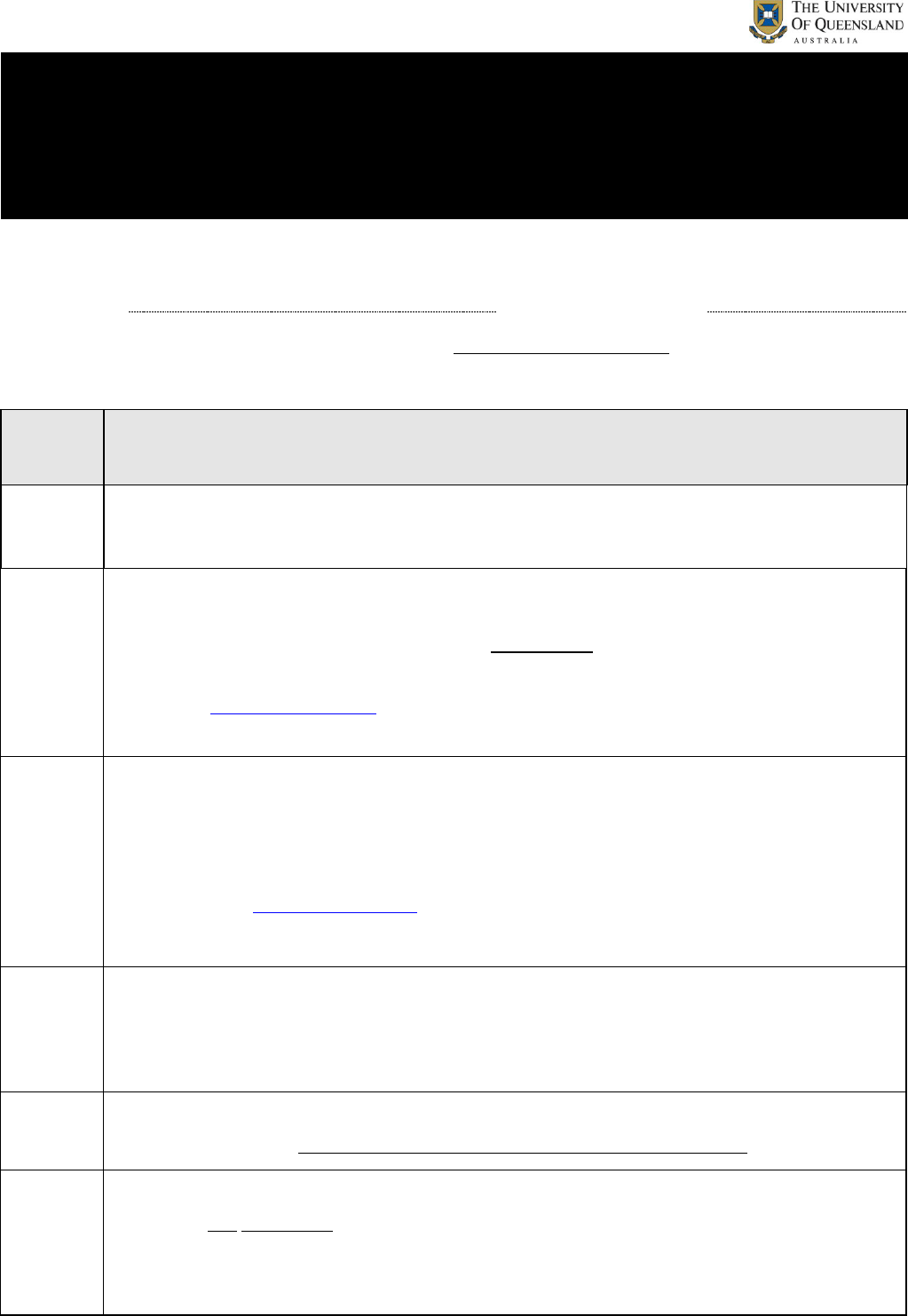
30
Student Name:
Student Number:
Please ensure the following requirements have been met before you start placement. Contact Naomi if you have any
questions.
Tick when
completed
To Do
1. All compliance requirements (Blue Card, Immunisations, Placement Safety Modules)
… have been completed and verified as per the HABS Prepare for your Placement website.
2. Signed Student Declaration Form
• When your placement has been confirmed and accepted, you will need to organise a
signed Student
Declaration Form (Appendix 2). A word version is available on
Blackboard.
• Email the Student Declaration Form, signed by you and your placement agency, to Naomi
at n.hansar@uq.edu.au
. Naomi will organise for Denis to sign the form and then return it
to you.
3. Start Date for Placement / request for early start date
• Placements usually commence in Week 1 of Semester 1, however you can negotiate your
start date with your placement agency.
• Some agencies will request/require an early start date. You as the student can also
request an early start date. Early starts need to be requested, in writing, to the Placement
Officer (n.hans[email protected]u
)
• Confirm the start date with Naomi, once known.
4. Completion of 8 pre-requisite courses AND Core Competency Interview
You must have passed the 8 pre-requisite first year courses to undertake placement. You must
also pass your Core Competency Interview before going on placement (undertaken in
conjunction with COUN7006 or within 6 months of starting placement).
5. Enrolment in Placement Course – COUN7020 OR COUN7021
… enrol via Si-Net. You will need to enrol in both Semester 1 and Semester 2.
6. UQ Placement Orientation Workshop
Attend one compulsory Master of Counselling Placement Orientation Workshop at UQ.
Dates for 2022 are:
1. Friday 28
th
January, 9.30am-12.30pm (for students starting placement early)
2. Monday 14
th
February, 9.30am-12.30pm (all other students).
Appendix 1: Pre-Placement Requirements
The University of Queensland Master of Counselling
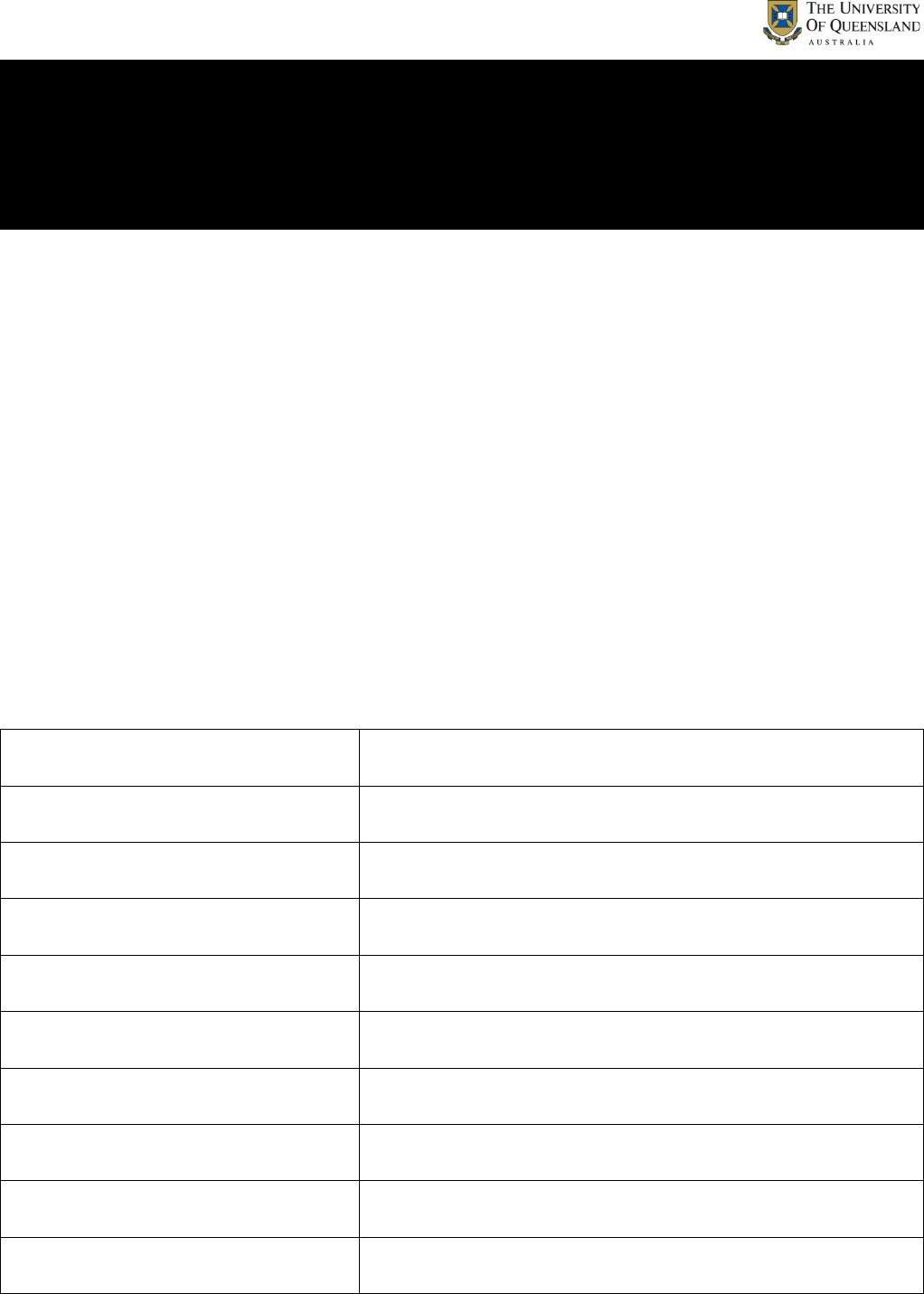
31
Before commencing my placement in the assigned agency in order to satisfy a compulsory part of the Master
of
Counselling Program, I acknowledge that I understand and fully accept the following:
1. The agency in which I am to be placed is not a part of the School of Nursing, Midwifery and Social Work or the
School of Psychology at The University of Queensland (“the Schools”). However, I have been accepted as a
practicum placement student at the Schools’ request, to allow me to gain experience in the normal day-to-day
operations of the setting. As a result, I acknowledge the generosity of the agency and its staff in offering the
university and myself this opportunity. I also then acknowledge my responsibility to myself, the agency and the
University to ensure that all my actions within placement are considerate, thoughtful and respectful, of all
involved in this experience.
2. While undertaking my practicum placement I understand that I will be subject to the rules, regulations and by-
laws of the placement agency and any governance policies of this agency, and will accept and comply with the
agency’s procedures and the directions of its staff.
3. I understand that any issues concerning my actions or competency can, and should, be referred as soon as
possible to the University staff overseeing my placement. It is envisaged that all efforts will be made to sort out
issues but I recognize that, where appropriate, my placement may have to be terminated. In particular, if actions
of mine compromise or impede the safety of clients, staff or myself and immediate notification of the School is
not possible, the agency may act at once to remove me from its premises, or refuse me admission (as the case
may be). The agency will then notify the School of any such action as soon as is realistically possible, and the
School will investigate the matter.
Student’s Full Name: (Please Print)
Student UQ ID:
Student’s Signature:
Date:
Name of Agency:
Agency Supervisor’s Full Name: (Please Print)
Agency Supervisor’s Signature:
Date:
UQ Staff Member’s Signature:
Program Lead (Professor Denis O’Hara)
Or Designated Representative
Date:
Appendix 2: Student Declaration
The University of Queensland Master of Counselling
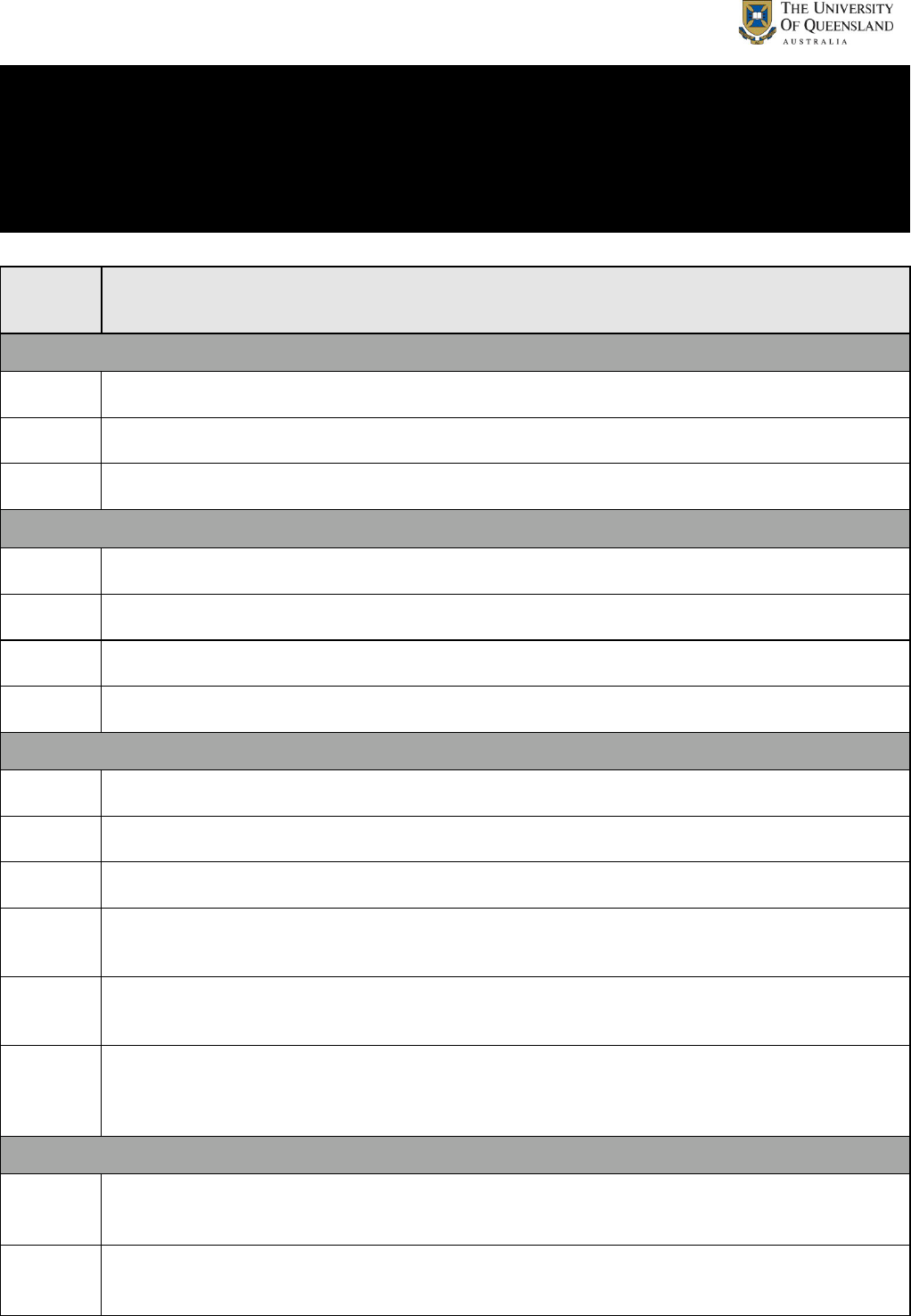
32
Tick when
completed
Checklist
PRIOR TO PLACEMENT
Sign the Student Declaration Form (see Appendix 2)
Negotiate with student a scheduled commencement date
Provide current supervisor contact details to student
FIRST WEEK OF PLACEMENT (Before work with clients)
Read through the Practice Education Manual
Ensure the student has an induction/orientation to the agency.
Provide student with daily task supervision or appoint another staff member to do so.
Jointly prepare a Supervision Contract (see Appendix 5) with the student
DURING PLACEMENT
Ensure students have opportunities to observe and undertake direct work with clients
Provide regular supervision as per the Supervision Contract (Appendix 5)
Regularly sign Log of Hours and Activities throughout the placement (see Appendix 10C)
Observe at least one session of the student as counsellor and provide feedback using the
Core Skills Competency Checklist (see Appendix 7)
Participate in a Placement Review meeting (Appendix 6) organised by the Placement Officer in
conjunction with the student
Jointly complete the Formative Supervisor Evaluation of Student Practice Form (see
Appendix 8) with the student by the end of the first semester of placement (to be submitted by the
student)
TOWARDS END OF PLACEMENT
Jointly complete the Summative Supervisor Evaluation of Student Practice Form (Appendix
10A) with the student (to be submitted by the student as part of their final practicum portfolio)
Support, assist and guide students to ‘wind down’ with clients being mindful that students need
time to focus on UQ assessments in the final month of the semester
Appendix 3: Agency Supervisor Checklist
The University of Queensland Master of Counselling

33
Discussion Points
Before formally completing the Supervision Contract it is important to consider the points below. This is usually
done during the first formal meeting between you and the supervisor. While not prescriptive, the points below
may provide discussion points. Once there is agreement between the parties on these areas, you complete the
Supervision Contract and return it to the supervisor for comment and modification. Once both parties are in
agreement as to its content, it is to be signed by both parties and returned to the Course Coordinator.
1. Setting up the placement
This includes access to phone, computers, desk space, transport or meeting transport costs incurred at the
agency, hours of work, protocols for accessing other staff, processes for negotiating work assignments,
balancing agency needs and learning needs in the agency, access to policy and procedure manuals for the
organisation.
2. Expectations of experiences while on placement
This includes discussions of the mix of individual counselling, co-counselling, group involvement,
observation of counselling and other counselling activities to be carried out to ensure the student meets the
basic requirements of professional associations and course requirements. The manner in which the student
will take on increasing responsibilities and how this involvement will be monitored should be considered. It
may also include the mechanisms by which allocations will be made and issues such as agency policies of
record keeping and confidentiality issues.
3. Structure for supervision
This includes frequency, time available, what will happen if supervision times have to be changed, records of
supervision, responsibilities for agenda setting for supervision, evaluating the use made of supervision by
both people.
4. The content of supervision sessions
This section considers information on how time is to be spent in supervision, and any agreements about
work to be done and brought to supervision sessions by both people. Specifically it might cover discussion of
learning styles, and processes for becoming involved in the counselling work of the agency.
5. Expectations of supervision
This includes what each person wants to achieve in supervision sessions, what they are prepared to
contribute to sessions, what they each have responsibility for in supervision, giving and receiving feedback in
relation to supervision, how student progress is monitored, including records of supervision to be kept.
6. Ethical issues; and recognising and managing potential difficulties
These discussions consider possible problems that may arise during placement. These may be practical
issues such as supervisor absences, relationship issues between the supervisor, other staff and the
student, and issues of recognized deficiencies in the student’s placement performance. Means by which
these issues can be addressed early should be considered. Ethical issues and relevant Codes of Ethics should
also be discussed. Please note that following the implementation of UQ’s Fitness to Practice policy, procedures
to identify and support At-Risk students have been developed and are included in this Manual.
Appendix 4: Learning Agreement
The University of Queensland Master of Counselling
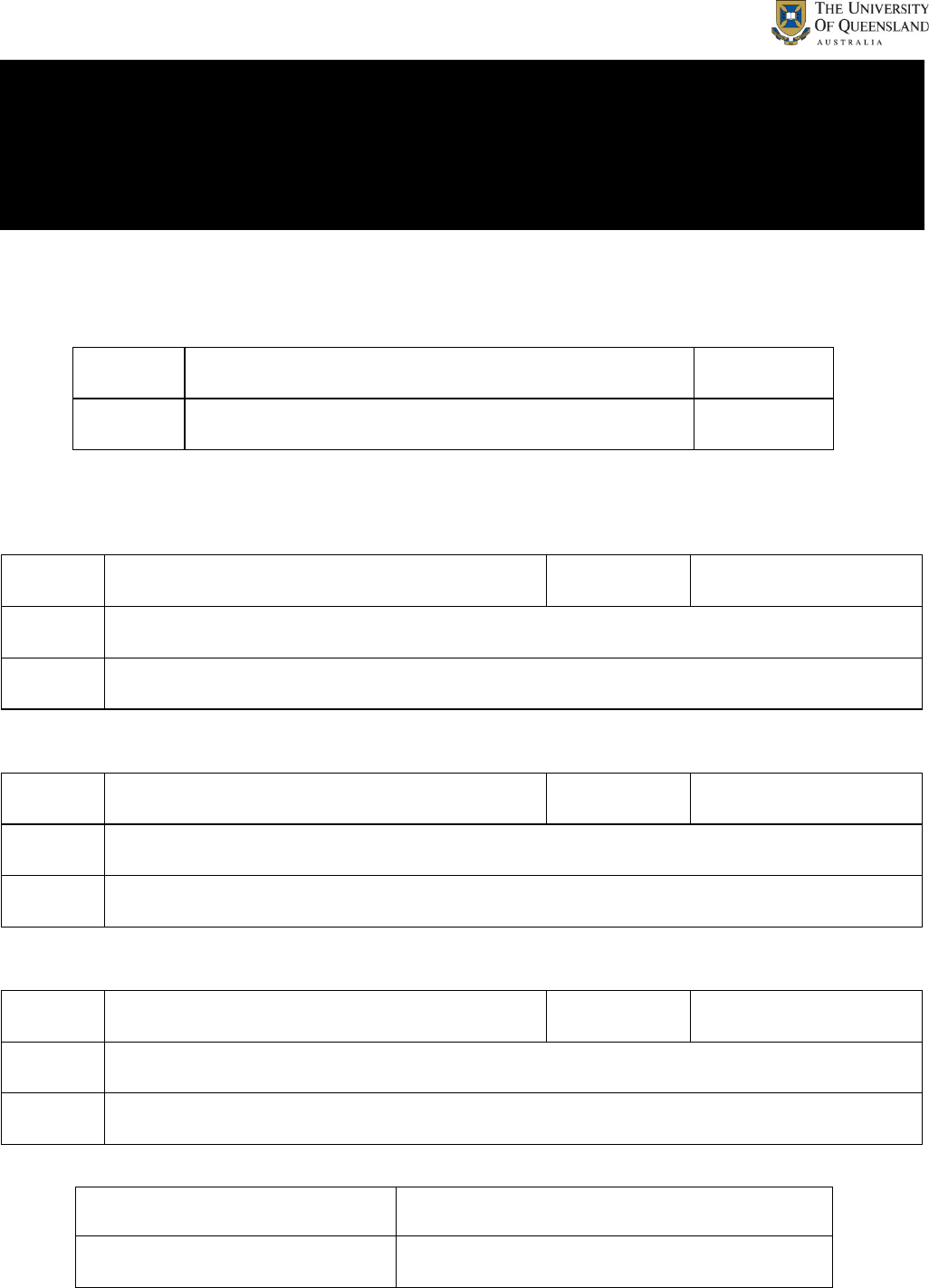
34
To be completed at the beginning of your first semester
and submitted to the COUN7020 / COUN7021 Course Coordinator
by the due date specified in the ECP
Between (Supervisor)
and (Student)
Contact Details:
Student
Name: Telephone:
Address:
Email
Placement Agency Supervisor
Name: Telephone:
Address:
Email
COUN7020 Course Coordinator
Name: Mr Jim Schirmer Telephone: 07 3346 7026
Address: University of Queensland
Commencement of Placement:
Termination of Placement:
Appendix 5: Supervision Contract
The University of Queensland Master of Counselling

35
* Please read and discuss the Learning Agreement (Appendix 4) before
completing this form.
1. Setting up the placement
Note here any relevant information, protocols or processes eg who will students be working with? How
will students access support outside formal supervision and negotiate work responsibilities?
2. Expectations of experiences and responsibilities for the placement
Consider what mix of counselling experiences and other placement activities will be available for the
student; how the student will take on increased responsibilities and how will this be monitored; what
specific responsibilities the supervisor will have; how policy and procedures will be made known; etc
Supervisor
Student
Examples:
• Attendance at student’s case
presentation.
• Participation in regular supervision
meetings.
• Provide clinical supervision of the
student for clients they are seeing
through the placement agency.

36
3. Structure for supervision
In addition to frequency and duration, you might consider: Who is responsible for setting the agenda?
How will records be kept? How will supervision be evaluated? etc
Frequency: Duration: Location:
4. Content of supervision sessions
You might consider, among other things: how time will be spent in supervision; what work will be
done and brought to supervision sessions by both people; learning styles; processes for becoming
involved in the counselling work of the agency; etc

37
5. Expectations of supervision
This includes what each person wants to achieve in supervision sessions; what each will contribute;
what they have responsibility for; preparation; feedback; monitoring student progress; records etc
Supervisor
Student
6. Ethical Issues and Managing Problems within Supervision
Points may include, but are not limited to: relevant Codes of Ethics as they apply to supervision
processes; confidentiality as applied to supervision processes; relationship issues between student
and supervisor or staff; supervisor absences; concerns about students’ performance; means of
addressing problems (see p.9-13 for information regarding Student At-Risk/Fitness to Practice).

38
7. Any other considerations - Supervisor
Any other considerations - Student
Supervisor:
Signature
Date
Student:
Signature
Date
Course Coordinator:
Signature
Date
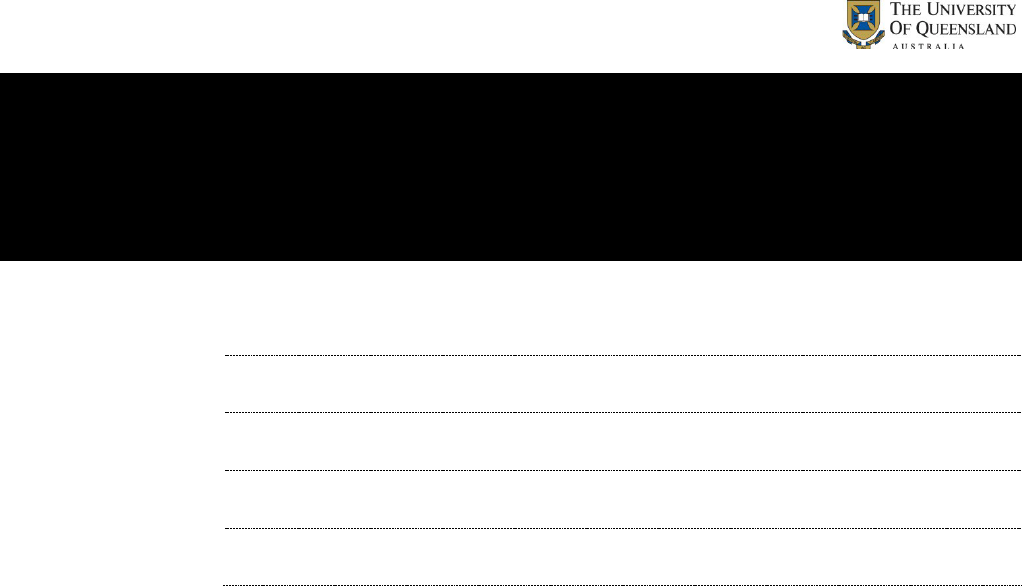
39
Student Name:
Agency:
Supervisor:
Liaison Visitor:
Date:
1. Outline and comment on the placement activities to date.
2. Comments on how supervision is going (e.g. regularity and types of formal/informal supervision).
3. What particular areas of learning will the student need to focus on for the remainder of placement?
4. Is the placement on track to meet the requirements for attendance, client contact and supervision hours (364/
60/15 hours respectively)? What weekly/monthly targets are needed to ensure they will be met?
Appendix 6: Placement Review
The University of Queensland Master of Counselling
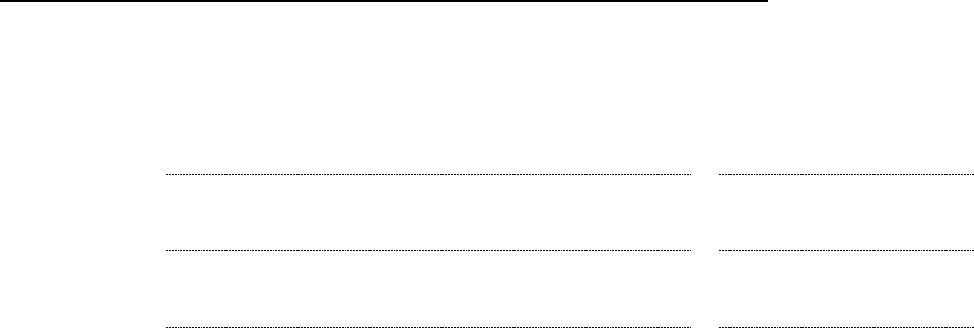
40
5. If relevant, what progress has been made on the research proposal and report? What steps need to be taken?
6. Have any issues or concerns been identified? If Yes:
a. State any potential/actual issues or concerns that have been identified during the review:
b. How will these issues be addressed (i.e. by whom and by when)?
7. Learning journal sighted? If not, negotiated course of action:
8. Log of hours sighted and satisfactory? Comments:
9. Is the student continuing with this agency in Semester 2? Yes / No (please circle)
If no, please ensure that Appendix 10A, B and C are completed by placement end.
10. Is the agency planning to have UQ students on placement next year? Yes / No (please circle)
Student
Print Name & Signature
Date
Agency Supervisor
Print Name & Signature
Date
Liaison Visitor
Print Name & Signature
Date
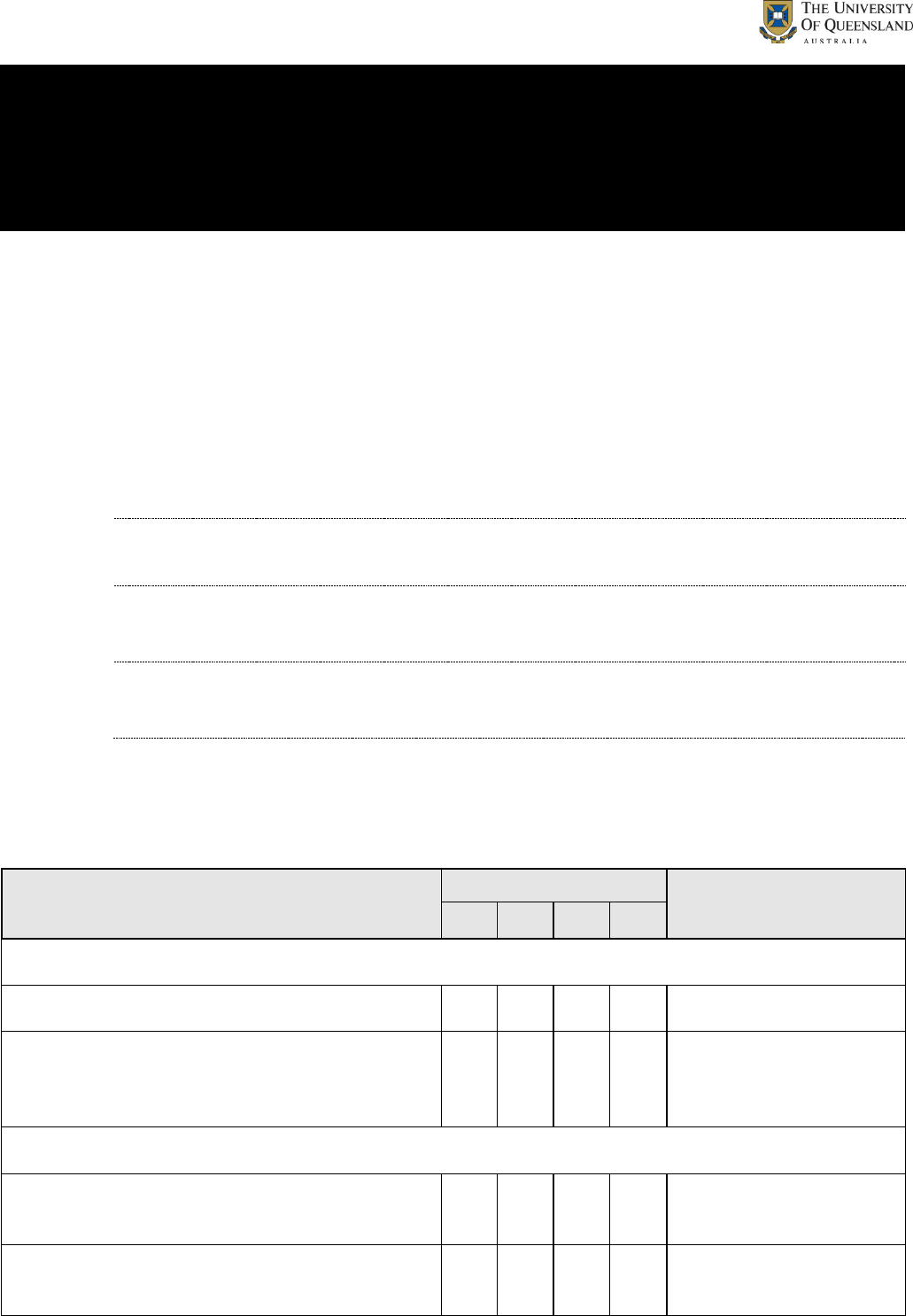
41
To be completed during your first semester
and submitted to the COUN7020 / COUN7021 Course Coordinator
by the due date specified in the ECP
Throughout the Master of Counselling Placement experience there are a number of core counselling skills that a
student is expected to further develop and demonstrate during an individual counselling session. A list of these
competencies is attached. Your supervisor will indicate the degree to which it is considered that you are competent
in these areas. This formative checklist may help your supervisor to plan your work and provide more information for
the agency evaluation of your practice.
Student:
Supervisor:
Agency:
Date:
Levels of Competence
1 = Competent
2 = Becoming Competent
3 = Not Competent
4 = Do not know or Not Applicable
Skill
Level of Competence
Comments
1 2 3 4
PROFESSIONAL MATTERS
Knowledge of legal and ethical guidelines
Clarifying and negotiating the roles and
responsibilities of a counsellor (e.g. within an
interdisciplinary team).
COUNSELLING SKILLS
Greeting
Initiating a discussion
Appendix 7: Core Skills Competency Checklist
The University of Queensland Master of Counselling

42
Skill
Level of Competence
Comments
1 2 3 4
Helping the other person feel relaxed
Being relaxed himself or herself
Maintaining appropriate distance
Using touch as appropriate
Maintaining appropriate eye contact
Keeping quiet when appropriate
Smiling appropriately
Using minimal encouragers
Repeating words from last statement
Not interrupting
Physical attending
Remembering what the other person has said
Asking open questions
Reflecting back recent statements
Paraphrasing what other person has said

43
Skill
Level of Competence
Comments
1 2 3 4
Avoiding talking about self and own issues
Being aware of own feelings
Expressing own feelings
Recognizing feelings in other person
Feeding back the feeling recognized in client
Pointing out differences of
statement/expression of feelings
Being honest
Encouraging self-disclosure from the other person
Accepting sensitive self-disclosure
Using self-disclosure skillfully
Keeping the other person’s self- disclosure
confidential
Pointing out inconsistencies in verbal and non-
verbal communication
Challenging the other person
Challenging in way that encourages a
response
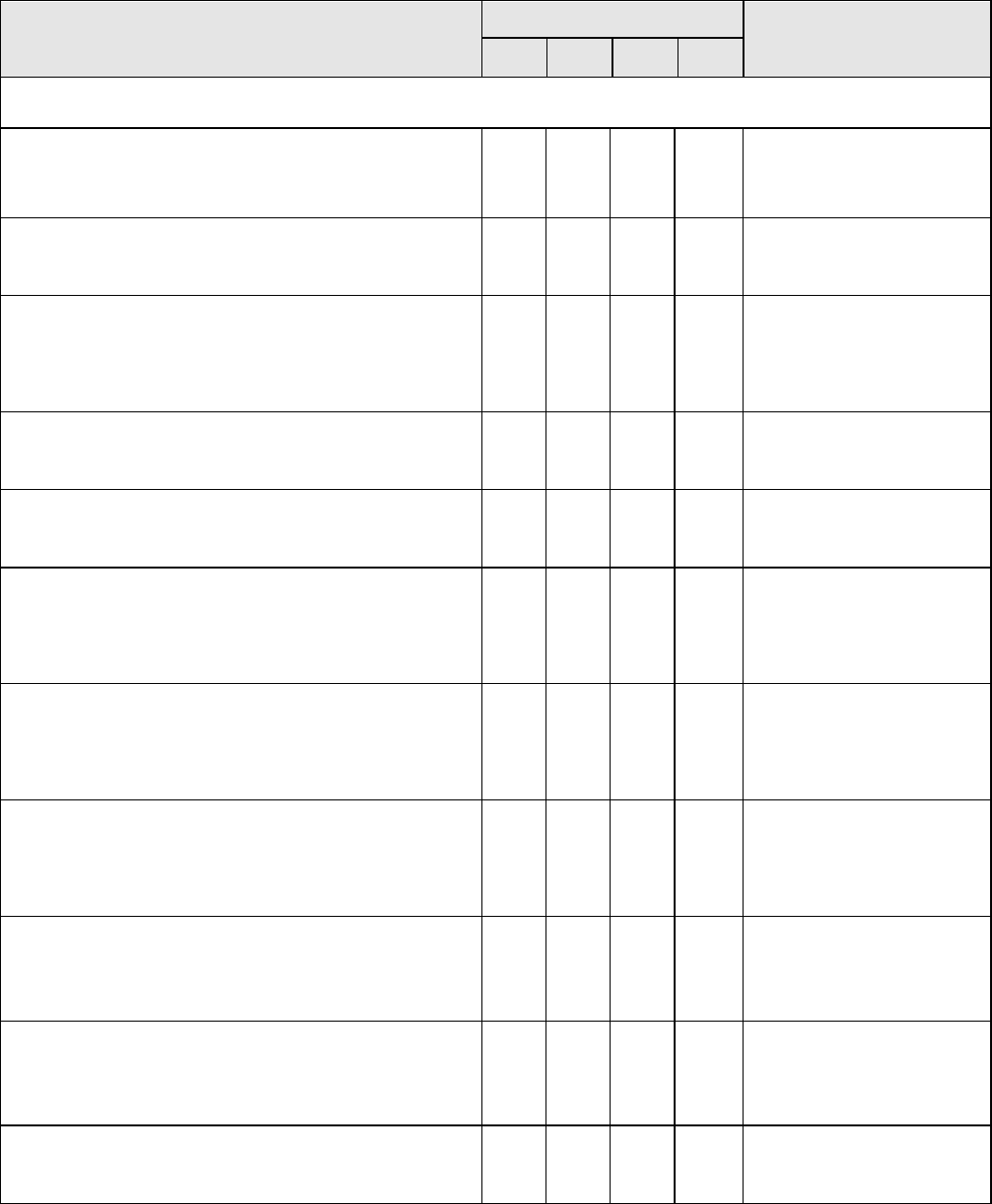
44
Skill
Level of Competence
Comments
1 2 3 4
THE COUNSELLING PROCESS
Ability to generate alternate hypotheses
Integrating multiple sources of data to
ascertain an intervention strategy
Develop a rationale for interventions, explain same to
the client
Negotiating goals and implications
Session structuring
Employing strategies for enhancing client compliance
and minimising client resistance
Introduction and management of termination of
cases
Ability to apply basic techniques (eg crisis
management, cognitive restructuring
Ability to manage counselling in the face of atypical
responses of a client (including failure to respond)
or client resistance
Ability to understand and give a rationale for
limitations in the application of specific techniques
Ability to evaluate the outcomes of the
application of specific techniques
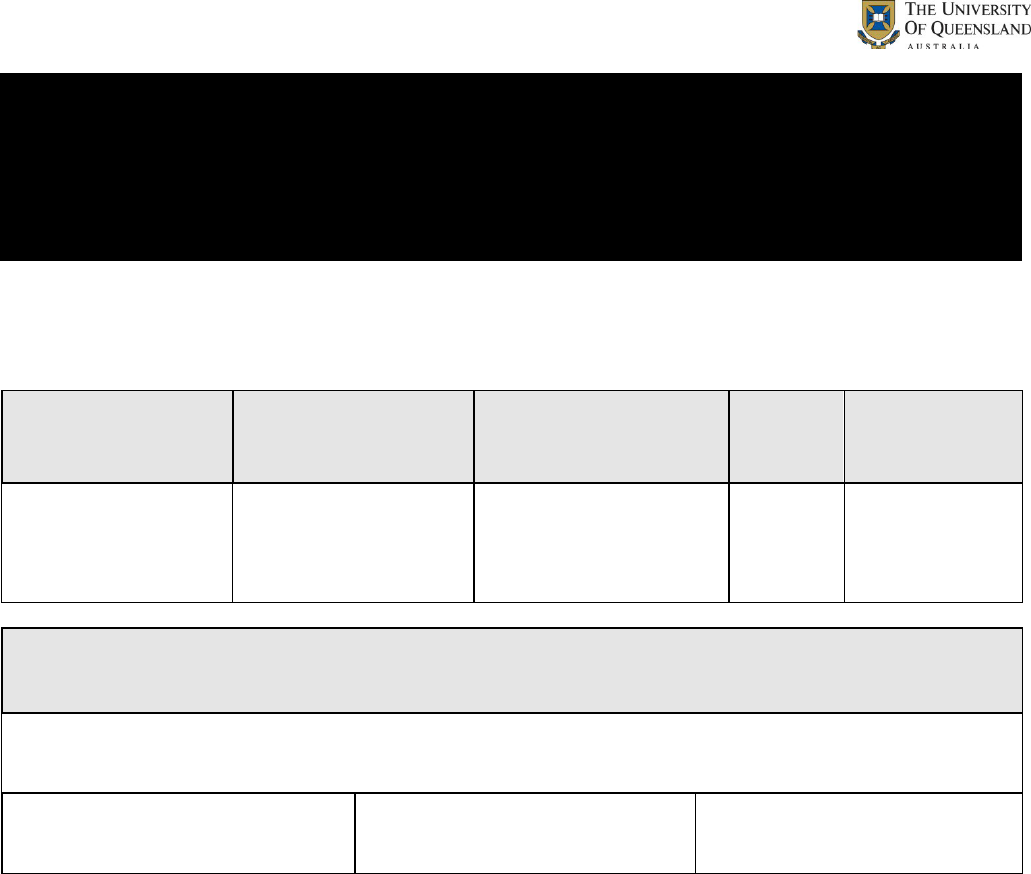
45
To be completed towards the end of your first semester
and submitted to the COUN7020 / COUN7021 Course Coordinator
by the due date specified in the ECP.
Student Supervisor Agency Date Evaluation
FORMATIVE
FEEDBACK
NO GRADE
Assessment Method
The following evaluation is based on assessment of the student using these methods (Tick all appropriate):
Discussion of Supervision Direct Observation Assessment
Use of DVD: Yes
No
Overall Recommendation
Acceptable Standard
The student is deemed to have achieved a satisfactory or better level of knowledge, skills and application to
counselling practice and behaves in an ethical and professional manner at all times.
Remediation Required
The student is advised to undertake a remedial program that is designed to address the following specific areas (to
be planned by UQ Course Coordinator for the course in consultation with the agency supervisor and the student at
a joint meeting):
1.
2.
3.
4.
5.
6.
7.
Appendix 8: Formative Supervisor Evaluation of
Student Practice Form
The University of Queensland Master of Counselling

46
Requirement
Comments/Details
COUNSELLING RELATIONSHIP
Can demonstrate communication of core qualities:
1. Empathy - understanding clients from their
point of view, being with them in their world)
2. Non-critical acceptance - being able to suspend
judgement and criticism, listen by giving
complete attention, so that client feels valued
for themselves
3. Genuineness - the ability and willingness to be
open, real and consistent in relationships with
clients, prepared to give time and attention,
not wanting to manipulate or patronise the
clients. Clients feel they are with a real person,
not someone in a professional role.
EXPLORATION
Enables clients to explore from their frame of
reference and to then focus on specific concerns,
demonstrated through attention giving, listening
and active listening.
NEW UNDERSTANDING
Enables clients to help to see themselves and
their situations in new perspectives and to focus
on what they might do to cope more effectively.
They are helped to see what strengths and
resources they might use. Demonstrated through
all the skills used in exploration and the
communication of deeper empathic
understanding, helping clients to recognise
themes, giving information, immediacy and goal
setting

47
Requirement
Comments/Details
ACTION (IF APPROPRIATE)
Clients are helped to consider possible ways to
act, to look at consequences, to plan action and
to implement and evaluate it, demonstrated
through all the skills used in exploration, new
understanding and creative thinking, “brain
showers”, problem solving and decision making.
PROFESSIONAL WORKING PERSONA
Good Communication within the Agency;
punctuality, regular attendance for the two full
days a week during University semesters,
respectful working relationships and practices with
staff and visitors.
SUPERVISION
Supervisee takes part willingly in a Novice
Supervisory Alliance and makes use of
structured supervision. The
supervisee
prepares
appropriately for the supervision session,
demonstrating evidence of reflective practice, and
insight into potential issues of transference and
counter-transference. The supervisee also
demonstrates the ability to receive constructive
feedback which is then incorporated into future
practice.

48
Requirement
Comments/Details
THEORY INTO PRACTICE
Supervisee is able to articulate practice using
counselling theory/ theories in verbal and written
reports, meetings and other agency required
forums.
KNOWLEDGE OF CLIENT GROUPS &
REFLECTIVE PRACTICE
Supervisee is able to reflect on, research and bring
newly gained understanding into the particular
client group/groups of which his/her clients are
members.
OTHER AGENCY ACTIVITIES
Supervisee is willing to be involved and make other
positive contributions to life of the agency.
LEARNING JOURNAL
Supervisee has maintained their reflective learning
journal throughout the placement.
Learning Journal Sighted: YES / NO
Supervisor should sight the journal. It is not necessary to
read or assess as students may keep journals private
ANY OTHER COMMENTS

49
SUPERVISOR’S SUMMARY
DEMONSTRATION OF RELATIONSHIP BUILDING CHARACTERISED BY CORE QUALITIES
Excellent
Very Good
Good
Satisfactory
Poor
Very Poor
Extremely Poor
COMPETENCY IN SKILLS (Please use proforma provided)
Excellent
Very Good
Good
Satisfactory
Poor
Very Poor
Extremely Poor
PROFESSIONAL APPROACH TO AGENCY WORK ENVIRONMENT AND TO SUPERVISION
Excellent
Very Good
Good
Satisfactory
Poor
Very Poor
Extremely Poor
Student’s Current STRENGTHS
Student’s Current AREAS TO WORK ON
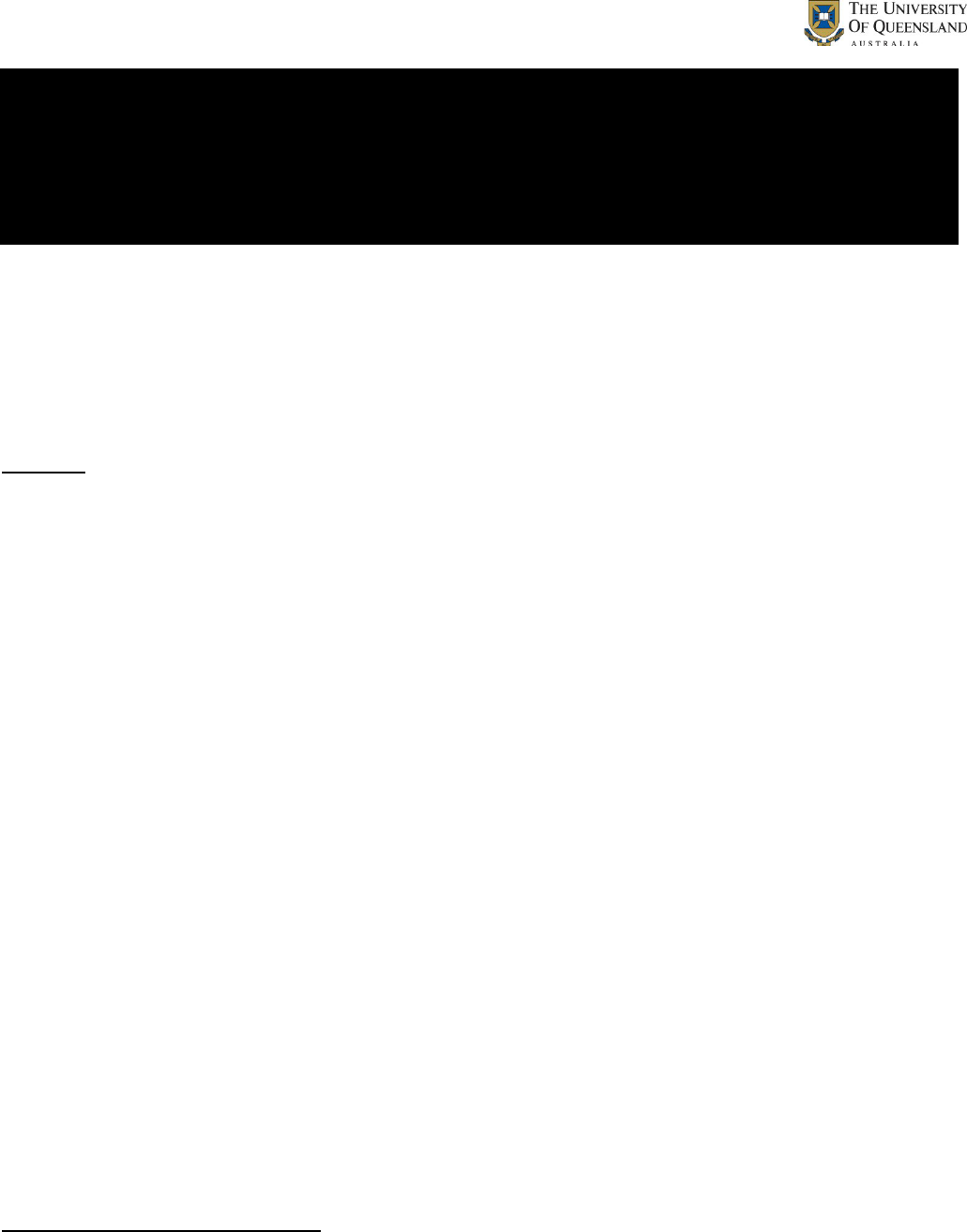
50
The Project Plan is completed during Semester 1
Students will submit this assignment to the COUN7020 Course Coordinator through Turnitin, via Blackboard,
by the due date specified in the ECP (Electronic Course Profile)
NB If you are enrolled in COUN7021, you will complete a similar project plan in HLTH7310. Please see the
HLTH7310 ECP for specific details.
Overview
You will be required to write up a Project Description for the research project that you will then implement and
report in the second semester of placement. The purpose of the research project is to extend your knowledge on a
practitioner-relevant question using a formal research methodology.
A Project Description is designed to give a concise, structured summary of the purpose, method and feasibility of
your project. Project Descriptions are often used in competitive processes (e.g. applying for funding) and
consequently effort should be applied to justify the decisions that you make. As such project plans typically address
a number of common areas:
• Rationale - introduce your topic for research, summarise the existing knowledge on this topic, and argue for
the importance of your specific research question
• Methodology/Design - outline and justify the method that you are using to answer your question. While the
exact categories will vary depending upon your methodology, at a minimum you would need to address:
o Methodological approach - rationale for choice of method and any informing theories of research
o Sources of data - the characteristics of the sources that will provide you the information to answer
you question (e.g. participants in qualitative/quantitative research; articles in systematic review)
o Recruitment - how you are going to recruit your chosen data sources (e.g. search strategy in
systemaic review; recruitment in qualitative/quantitative research)
o Data collection - methods for gathering the data from your chosen sources (e.g. interviews, surveys,
measures, data extraction table)
o Data analysis - methods that you will use to analyse the data to generate answers to your question
o Ethical Issues - major ethical issues involved in your topics an/or methodology, and how you will
address these
• Appendices of resources that you will need in order to complete the project. Again, these will be dependent
on the project, but students should consider:
o Completed 'Human Research Ethical Issues' form (available of Blackboard) - N.B. all students doing
projects with other humans must complete this
o Information sheets and consent forms for participants
o Survey/Interview Questions
o Search strategy and record keeping forms (e.g. for literature reviews)
o Data extraction tables
o Gatekeeper approval letter for projects being completed at placement
o Timeline for project
Task Description and Marking Criteria
For information on the curriculum and specific details of assessment, please see the Electronic Course Profile (ECP)
for COUN7020 (or HLTH7310). The ECP is the definitive document used by the University for what is required in the
task and the criteria against which it is marked.
Appendix 9: Project Plan
(COUN7020 only)
The University of Queensland Master of Counselling

51
Task Description
The practicum portfolio consists of three pieces of work including the Summative Supervisor Evaluation of Student
Practice Form (Appendix 10A), the Student Evaluation of Agency Form (Appendix 10B) and your completed
log of hours and placement activities (Appendix 10C).
Following are templates for use for these assessment items.
Appendix 10: Practicum Portfolio
The University of Queensland Master of Counselling
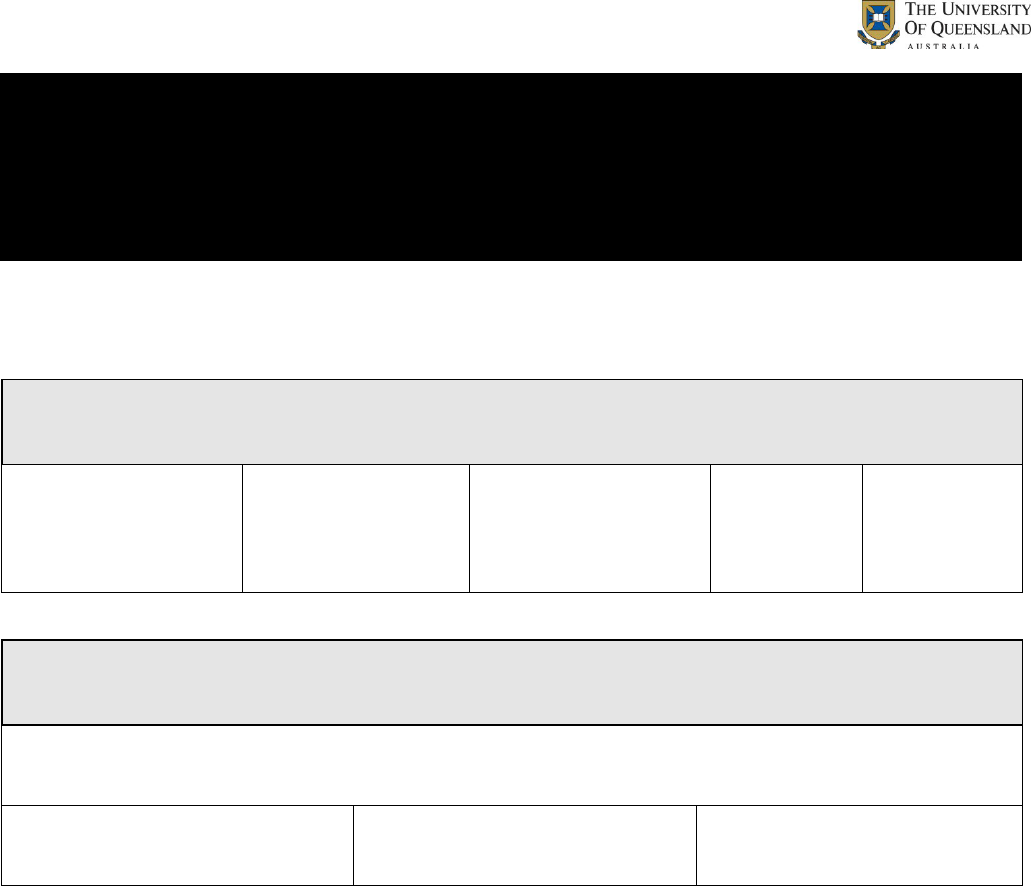
52
To be completed as part of the portfolio for Assignment 2 at the end of Semester 2 and submitted by the
student to the COUN7020 / COUN7021 Course Coordinator by the due date specified in the ECP.
Student Supervisor Agency Date Evaluation
SUMMATIVE
FEEDBACK
PASS/FAIL
Assessment Method
The following evaluation is based on assessment of the student using these methods (Tick all appropriate)
Discussion of Supervision Direct Observation Assessment
Use of DVD: Yes
No
Overall Recommendation:
Acceptable Standard PASS
The student is deemed to have achieved a satisfactory or better level of knowledge, skills and application to
counselling practice and behaves in an ethical and professional manner at all times.
Remediation Required
The student is advised to undertake a remedial program that is designed to address the following specific areas
(to be planned by UQ Academic Coordinator for the course in consultation with the agency supervisor and the
student at a joint meeting):
1.
2.
3.
4.
5.
6.
7.
Appendix 10A: Summative Supervisor Evaluation of
Student Practice Form
The University of Queensland Master of Counselling

53
Requirement Comments/Details
PASS/FAIL
COUNSELLING RELATIONSHIP
Can demonstrate communication of core
qualities:
1. Empathy - understanding clients
from their point of view, being with
them in their world)
2. Non-critical acceptance - being able
to suspend judgement and criticism,
listen by giving complete attention, so
that clients feels valued for
themselves
3. Genuineness - the ability and
willingness to be open, real and
consistent in relationships with
clients, prepared to give time and
attention, not wanting to manipulate
or patronise the clients. Clients feel
they are with a real person, not
someone in a professional role.
EXPLORATION
Enables clients to explore from their
frame of reference and to then focus on
specific concerns, demonstrated through
attention giving, listening and active
listening.
NEW UNDERSTANDING
Enables clients to help to see themselves
and their situations in new perspectives
and to focus on what they might do to
cope more effectively. They are helped to
see what strengths and resources they
might use. Demonstrated through all the
skills used in exploration and the
communication of deeper empathic
understanding, helping clients to
recognise themes, giving information,
immediacy and goal setting

54
Requirement Comments/Details
PASS/FAIL
ACTION (IF APPROPRIATE)
Clients are helped to consider possible
ways to act, to look at consequences, to
plan action and to implement and evaluate
it, demonstrated through all the skills used
in exploration, new understanding and
creative thinking, “brain showers”,
problem solving and decision making.
PROFESSIONAL WORKING
PERSONA
Good communication within the Agency-
punctuality, regular attendance for the
two full days a week during University
semesters, respectful working
relationships and practices with staff and
visitors.
SUPERVISION
Supervisee takes part willingly in a Novice
Supervisory Alliance and makes use of
structured supervision. The supervisee
prepares appropriately for the supervision
session, demonstrating evidence of
reflective practice, and insight into potential
issues of transference and counter-
transference. The supervisee also
demonstrates the ability to receive
constructive feedback which is then
incorporated into future practice.

55
Requirement Comments/Details
PASS/FAIL
THEORY INTO PRACTICE
Supervisee is able to articulate practice
using counselling theory/ theories in verbal
and written reports, meetings and other
agency required forums.
KNOWLEDGE OF CLIENT
GROUPS & REFLECTIVE
PRACTICE
Supervisee is able to reflect on, research
and bring newly gained understanding
into the particular client group/groups of
which his/her clients are members.
OTHER AGENCY ACTIVITIES
Supervisee’s willingness to be
involved and other positive
contributions to life of the agency.
LEARNING JOURNAL
Supervisee has maintained their
reflective learning journal throughout the
placement.
Learning Journal Sighted: YES / NO
Supervisor should sight the journal. It is not
necessary to read or assess as students may
keep journals private.
ANY OTHER COMMENTS

56
SUPERVISOR’S SUMMARY:
DEMONSTRATION OF RELATIONSHIP BUILDING CHARACTERISED BY CORE QUALITIES
Excellent
Very Good
Good
Satisfactory
Poor
Very Poor
Extremely Poor
COMPETENCY IN SKILLS
Excellent
Very Good
Good
Satisfactory
Poor
Very Poor
Extremely Poor
PROFESSIONAL APPROACH to AGENCY WORK ENVIRONMENT AND TO SUPERVISION
Excellent
Very Good
Good
Satisfactory
Poor
Very Poor
Extremely Poor
Student’s Current STRENGTHS
Student’s Current AREAS TO WORK ON
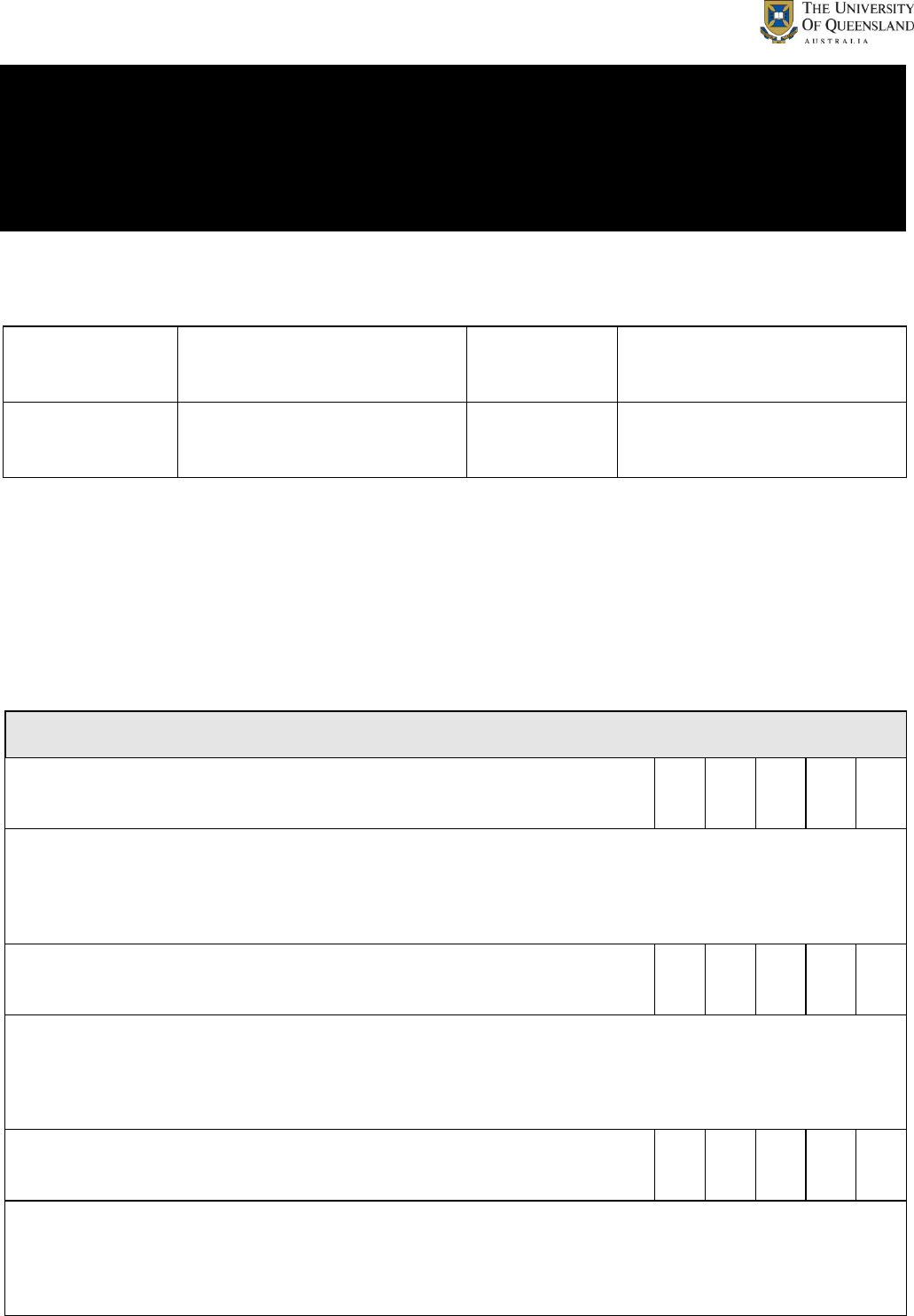
57
To be completed as part of the portfolio for Assignment 2 at the end of Semester 2 and submitted by the
student to the Course Coordinator by the due date specified in the ECP.
Student's Name: Supervisor:
Semester/Year: Date:
This form offers the student the opportunity to evaluate his or her placement at the end of the placement. It
provides valuable insight and feedback on placement experiences.
Satisfaction Levels
1 = Very Satisfactory
2 = Mostly Satisfactory
3 = Neutral
4 = Mostly Unsatisfactory
5 = Very Unsatisfactory
Part 1: Individual Supervision
1. Formalisation of your relationship in terms of your expectations and
your supervisor's expectations of you.
1 2 3 4 5
Comments
2. The level of interest shown by the supervisor in your activities during
placement.
1 2 3 4 5
Comments
3. Supervisor's ability to provide constructive feedback in a way that leads to
constructive change.
1 2 3 4 5
Comments
Appendix 10B: Student Evaluation of Agency
The University of Queensland Master of Counselling

58
Part 1: Individual Supervision
4. Supervisor's use of formal goal setting and planning. 1 2 3 4 5
Comments
5. Supervisor's professional conduct, i.e. punctuality, confidentiality, and
ability to deal with ethical issues.
1 2 3 4 5
Comments
6. Empathy – supervisor's ability to listen and see situations from the student's
perspective.
1 2 3 4 5
Comments
7. The supervisor's willingness and ability to deal constructively with issues
relating to the student's personal approach and characteristics.
1 2 3 4 5
Comments
8. Education – the degree to which the supervisor has added to the student's
conceptual understanding of the therapeutic process and the effectiveness of
various strategies.
2 3 4 5
Comments
9. Education – the degree to which the supervisor has taught practical skills
relevant to counselling.
1 2 3 4 5
Comments
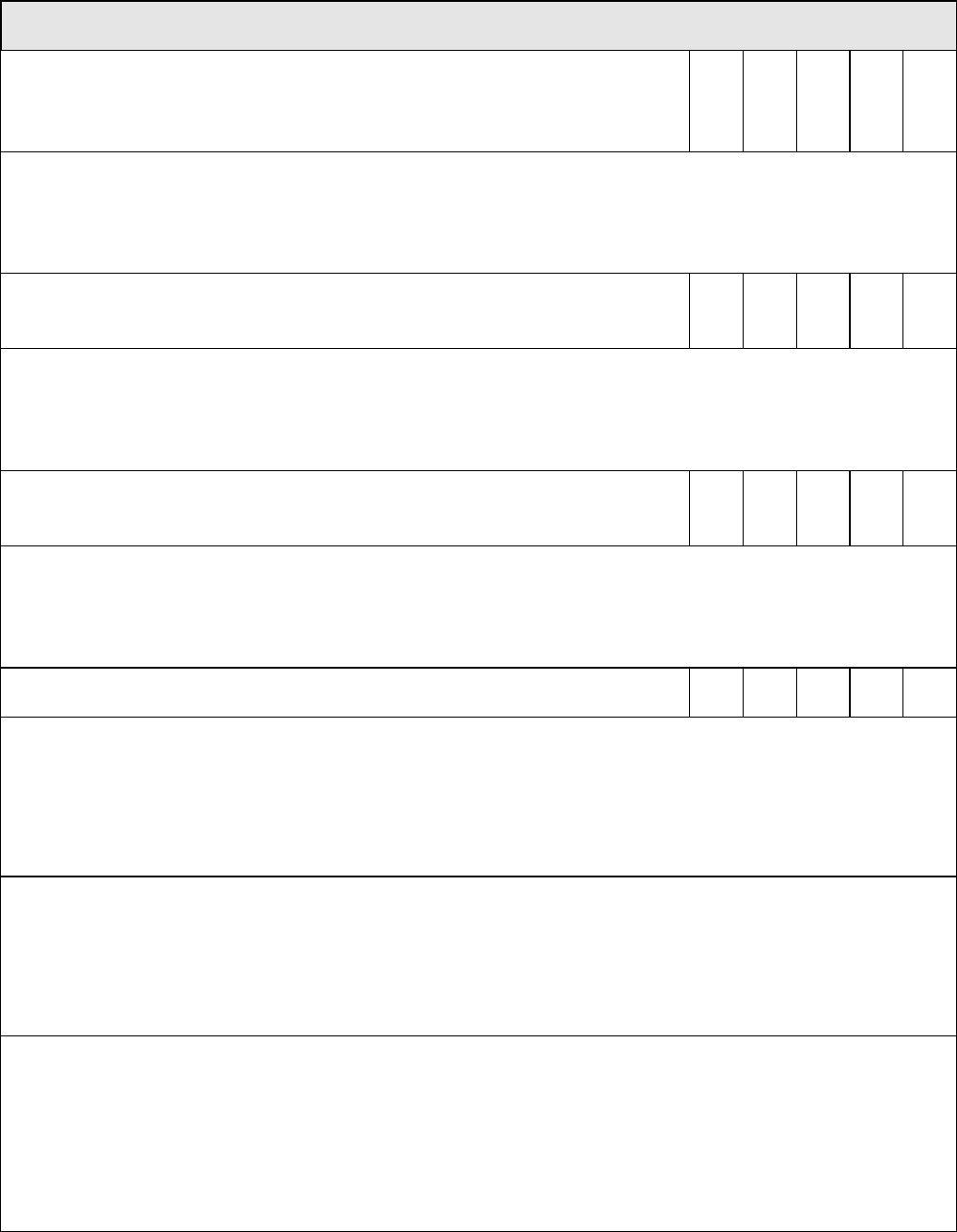
59
Part 1: Individual Supervision
10. The degree to which the supervisor conveys her or his personal commitment
and enthusiasm for her or his own therapeutic activities.
1 2 3 4 5
Comments
11. The degree to which the supervisor solicits and responds to student
feedback.
1 2 3 4 5
Comments
12. Assistance given in the selection, application and interpretation of
specialised assessment and intervention strategies.
1 2 3 4 5
Comments
13. Overall evaluation of individual supervision. 1 2 3 4 5
What have been the positive aspects?
What have been the negative aspects?
What suggestions do you have for improvement?

60
Part 2: Placement Activities
14. The degree to which you were familiarised with the organisation and
structure of the placement setting.
1 2 3 4 5
Comments
15. Access to rooms, materials, staff, and reference materials. 1 2 3 4 5
Comments
16. Selection and assignment of your case load. 1 2 3 4 5
Comments
17. Workload – hours spent in therapy, record keeping and other activities. 1 2 3 4 5
Comments
18. Administrative tasks – organisation, goals and relevance. 1 2 3 4 5
Comments
19. Research involvement – organisation, goals and relevance. 1 2 3 4 5
Comments

61
Part 2: Placement Activities
20. Case presentations – the goals and procedures and responses received
when presenting a case to the agency staff.
1 2 3 4 5
Comments
21. Clinical group meetings – the extent to which attendance at these meetings
adds to your general professional development.
1 2 3 4 5
Comments
22. Overall, how have you found the general activities of this placement? 1 2 3 4 5
What were the positive aspects?
What were the negative aspects?
Any suggestions for change?
Thank you for your comments
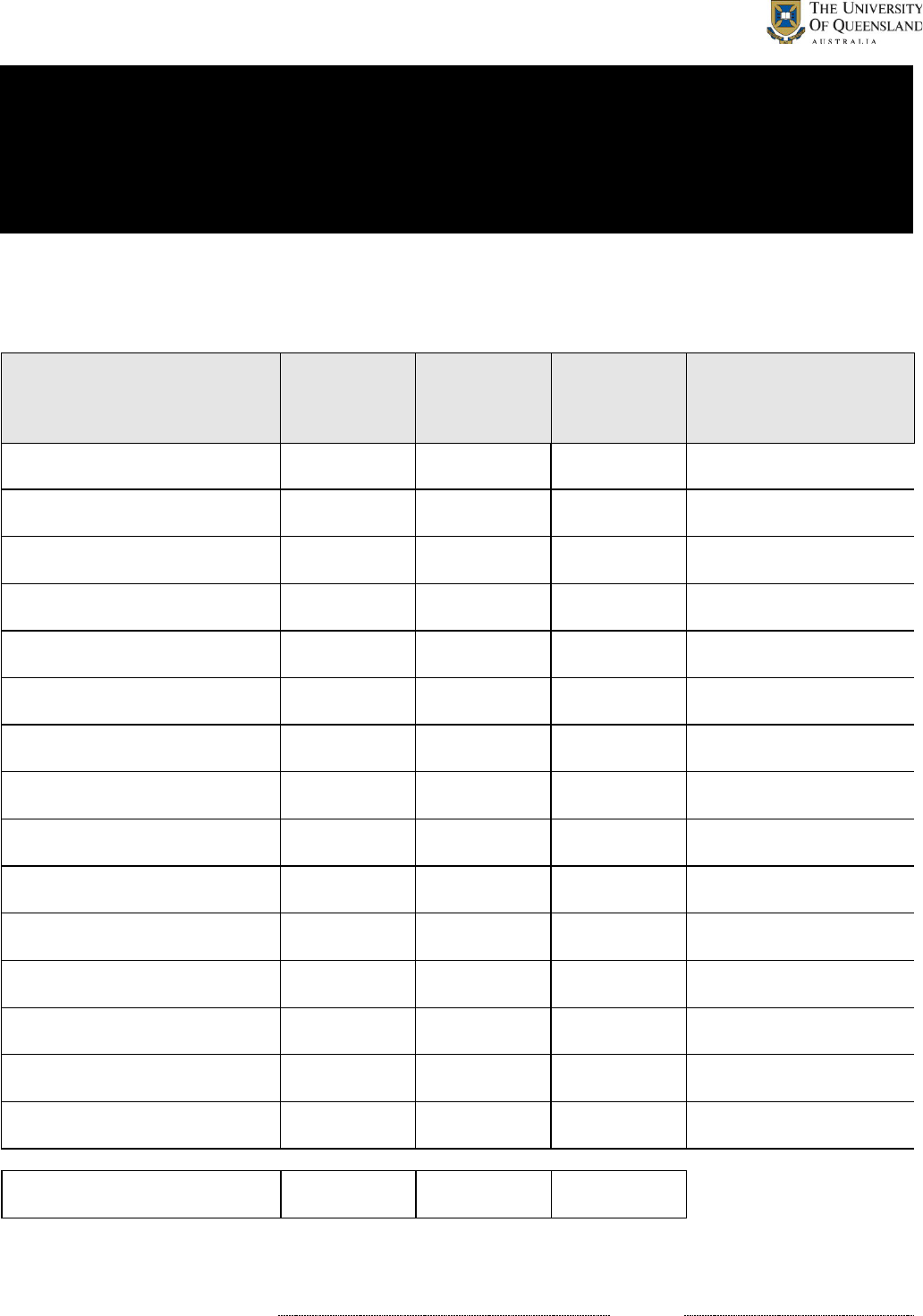
62
To be completed as part of the placement portfolio at the end of Semester 2 and submitted by the
student to the Course Coordinator by the due date specified in the ECP.
Date Activity Performed
Hours of
Attendance
Client
Contact
Hours
Supervision
Hours
Supervisor’s
Signature
Totals Brought Forward
Running Totals:
Signed by Agency Supervisor:
Date:
Appendix 10C: Log of Hours and Activities on Placement
The University of Queensland Master of Counselling
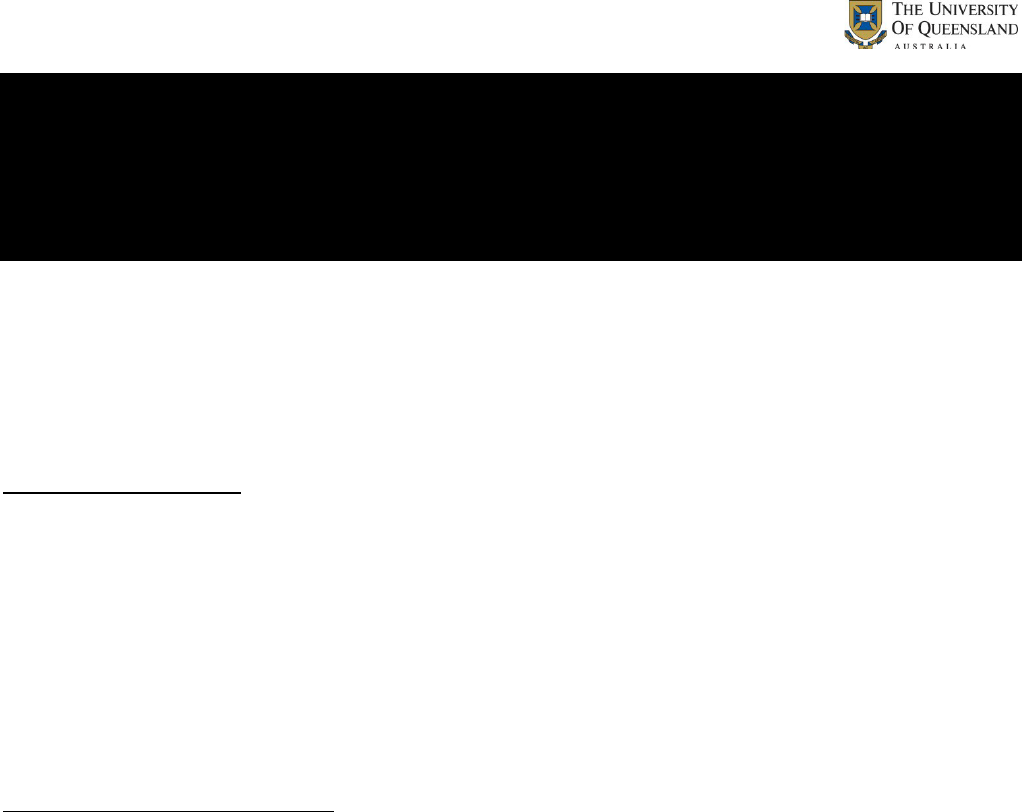
63
COUN7020 students complete and submit their Research Project Report during Semester 2.
Students enrolled in COUN7021 will complete a comparable task in HLTH7310.
Students will submit this assignment to the Course Coordinator, via Blackboard,
by the due date specified in the relevant ECP (Electronic Course Profile)
Research Report Overview
Students are required to submit a formal report of their research project which they started in first semester. The
purpose of a research report is to communicate the findings of a research according to the standard format of the
scientific literature. Therefore a report generally consists of the following section:
• Abstract (no more than 250 words)
• Introduction to the question and summary of pre-existing research
• Methodology – covering all standard heading in the chosen research method
• Results – accurately conveyed and communicated in an organised fashion
• Discussion and Conclusion – stating findings, comparing findings to previous research, stating the strengths
and limitations of the project, and making recommendations for future research and practice
Task Description and Marking Criteria
For information on the curriculum and specific details of assessment (including marking criteria), please see the
Electronic Course Profile (ECP) for COUN7020 (or HLTH7310). The ECP is the definitive document used by the
University.
Appendix 11: Project Report
(COUN7020 ONLY)
The University of Queensland Master of Counselling

64
(Adapted from the PACFA Training Standards, 2014)
Client Contact: Real life person-to-person contact with the client
A client may be an individual, a couple, a family or a group. Clients must have no pre-existing, personal or
professional relationship with the counsellor. Client contact involves a range of experiences of the trainee working
directly with clients where there are no dual relationships between the client and trainee:
• One to one counselling
• Couples counselling
• Family counselling
• Group counselling
• Co-therapy (as an active participant).
• Facilitation of client group workshops
• Crisis response/follow-up
• Psychological first aid
• Informal counselling/support
• Supervising clients whilst they perform some task
• Supervising child contact
• Home visits
• Assessments
Note: The following forms of ‘remote’ counselling can only count towards hours after an initial 40 hours of direct face
to face client contact has been achieved:
• Telephone counselling
• Skype counselling
• Online counselling
• Email counselling
Appendix 12: Definition of Client Contact, Non-Contact and
Supervision Hours
The University of Queensland Master of Counselling
65
Clinical Supervision: Opportunity for reflection and discussion of work to enhance practice
The process of clinical supervision is an opportunity for supervisees to present relevant material regarding their
clinical practice via case discussion, recordings of client sessions, role plays, etc, allowing a space for reflective review
by the supervisee and feedback by the supervisor:
Format of Supervision sessions includes but is not limited to:
• One to one supervision
• Group supervision (up to 12 members for the first 20 hours whilst in training, then up to 6 members)
Activities within Supervision sessions include but are not limited to:
• Observation of counselling
• Formal case presentation
• De-briefing about client issues
• Case consultation/formulation/discussion
• Case presentation at UQ workshops/courses
• Role plays, practice sessions
Note: Peer supervision does not count unless practitioners have at least 5 years clinical experience.
Examples of Non-Contact time:
• Case notes, write-ups, reports etc
• Preparation for group workshops, presentations etc
• Research related to client issues or for agency purposes
• Sending client feedback forms, arranging client referrals etc
• Filing/creating resources, brochures, handouts, forms, manuals, booklets etc
• Budgeting, data reporting, writing minutes/agenda for counselling meetings etc
• Self-care, professional development, team building, performance review etc
• Network meetings, steering committees etc
• Fire exercise/training/OH&S

66
A journal is a personal, reflective document that provides a number of valuable ways of engaging more deeply with
the values that guide your work, with the knowledge that extends your understanding, and with your own integrated
personal and academic learning through experience in your day to day practice. It provides the means by
which students, as reflective student practitioners, are encouraged to:
• Notice and put into your own words the ideas, perceptions, hunches, practice wisdom, lived experience,
hardships, joys, successes, frustrations and failings that are all available in this learning environment.
• Gain an experience of how reflective writing can significantly extend your capacity for reflective practice.
• Maintain your own personal record of significant events and important awareness, perceptions, ideas, facts,
resources, theories, hypotheses as well as a considered critique of issues occurring within this learning
environment.
Some basic questions that would help to extend the content and experience of this reflection:
• Setting – Where was I? What could I see, hear and feel in the setting?
• Personnel – Who was I involved with? Who else was in the range of my interaction?
• Content of the activity – What was I doing? Why?
• Account of the interaction – What did I do/say first? How? How could this be perceived by others (the
struggle for empathic understanding)?
• What was I thinking at the time? What happened next?
Some questions to extend self-awareness:
• How did I notice what was happening for me?
• What was I experiencing in my inner world?
• What was happening in my body? What body sensations did I notice?
• What feelings and emotions were aroused?
• If I sit with the dominant feeling, where does it lead me?
• What other lived experiences come to mind as I seek to be more attentive to what was happening for me in this
instance?
Some questions to extend critique:
• What are some of my assumptions, values, and beliefs?
• Where do these ideas come from?
• What is it that causes me to maintain these ideas?
• Whose interests are served by my beliefs, and corresponding action?
• What interests are served by my beliefs, and corresponding action?
Appendix 13: Journal for Learning and Personal Development
Guidance Notes
The University of Queensland Master of Counselling
67
• What competing views are apparent?
• How do my beliefs and values either constrain or enable my worldview?
• What acts to constrain my view that change may be possible?
Learning Incidents: Guide to reflecting on critical learning on practice
1. An incident critical to understanding a client. This would be an experience where you believed that an
incident has significantly heightened your awareness of the functioning of a person and provided you with
insight that positively affected your ability to work with this person and probably other clients in the future
2. An incident critical to improving your skills as a counsellor. This would be an experience where you
believed that an incident has significantly heightened your awareness of your abilities as a counsellor and
provided you with insight or skills that would positively affected your ability to work with clients.
When using this critical incident technique, you are invited to choose one situation of practice in which you are
an actor. It may not be a major event: it may be positive or negative. The following questions can be used to think
in some depth about what that situation meant to you.
Consider the situation. Reflect on the actual experience:
• What images do you recall?
• Which people/comments/words struck you?
• What sounds/smells/tactile sensations do you recall?
• Were there any other elements?
Next consider the affective domain. Reflect on the feelings:
• What was the high/low spot?
• What was/were your mood/feelings? What do you think was/were the other’s mood/feeling?
• Were you surprised/angered/elated/curious/confused/depressed, by anything in the experience?
Now interpret the events. What did you learn?
• What can you conclude about your understanding and skills related to the process of assessment/analysis from
this experience?
• What was your key insight/learning?
• How does this relate to your framework for assessment/analysis/planning?
Finally consider decisions
• What areas of understanding and skills need to improve as a result of your reflection?
• What would this change require?
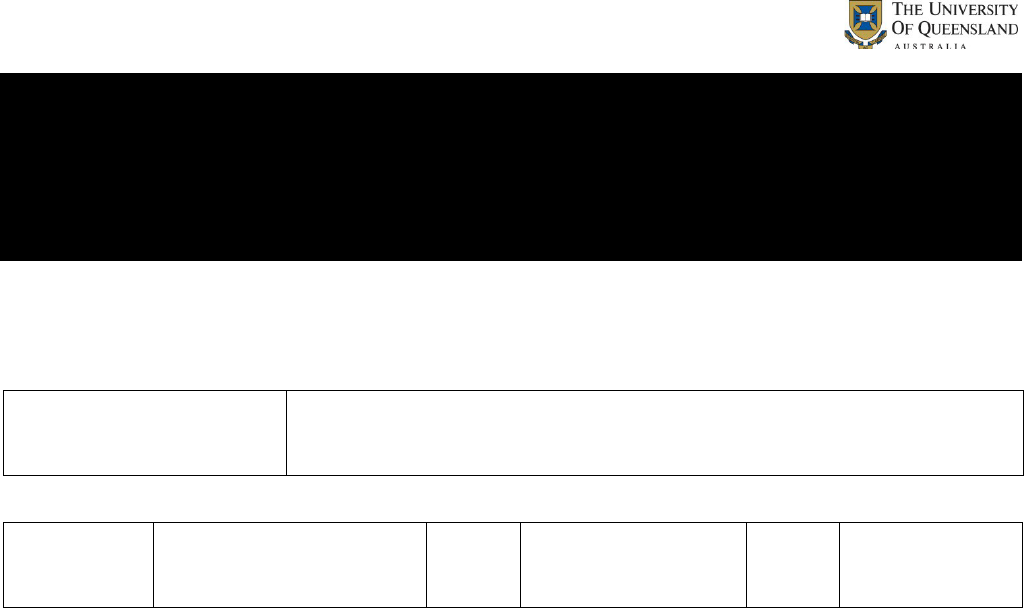
68
This may be a useful template to use to prepare case reports for your agency meetings and can also be used as
a framework for delivering case presentations during your placement workshops.
Client Code of
Pseudonym:
Date of
Birth:
Age: Sex:
Referral Information (eg details of referring person or agency and circumstances of referral)
Presenting Problem (as described by client. Include collateral information where possible)
History of Presenting Problem (including date of onset, development and course of the difficulty.
Contextual factors related to relief or exacerbation)
Previous Psychological / Emotional History (Include previous problems as described by client and their history.
Other information useful to convey the life situation may be personality, interpersonal relations, cognitive
functioning, and optimum previous functioning of the client. Include previous experience with human services and
helping professions where relevant.)
Appendix 14: Case Report Structure
The University of Queensland Master of Counselling
69
Family System (include relevant social, psychiatric and medical history of family members and inter-relationships
with client)
Current Support Adjustment (living arrangements, social support network etc)
Personal History (collect relevant history of personal development, education, occupation and relationships history.
This may then be related to levels of current functioning for your client.)
Assessment of Current Functioning
Consider holistic functioning including as many of the realms: physical, psychological, social and spiritual. Make
a summary of observations of all aspects of a client’s mental and physical state. Integrate this information from
a variety of sources if possible. Also, include current medical and alcohol and drug status and any other relevant
health information.
Clarification of Problems
Be specific and record your understanding of the complete nature of your client’s psychological, behavioural
and emotional issues at presentation. Provide a summary of your ongoing perceived and reflected upon client
issues after your interviews with your client.
Progress of Interviews
Provide a brief but thorough account of the counselling sessions undertaken with your client. Include the
hypotheses you made as to the causes and needs of the person, the means by which you ascertained what was
relevant, the goals decided on, and interventions considered. Remember that as your client begins to work on
deeper material your hypotheses may change as time goes by. Constant awareness and observation with carefully
recorded notes will help you to chart the dynamic nature of the therapeutic relationship and to shift your ideas of
what is relevant and the future interventions considered based on this fluidity of knowledge. This cyclical process
is the basis of reflective practice.
Current State of affairs and actions still required
Be aware that action may be required as you become more aware of the specific needs of your client. For
example, a letter to the referring agent, some further study involving academic counselling or other human
behaviour literature, ongoing counselling, referral, extra supervision session etc.
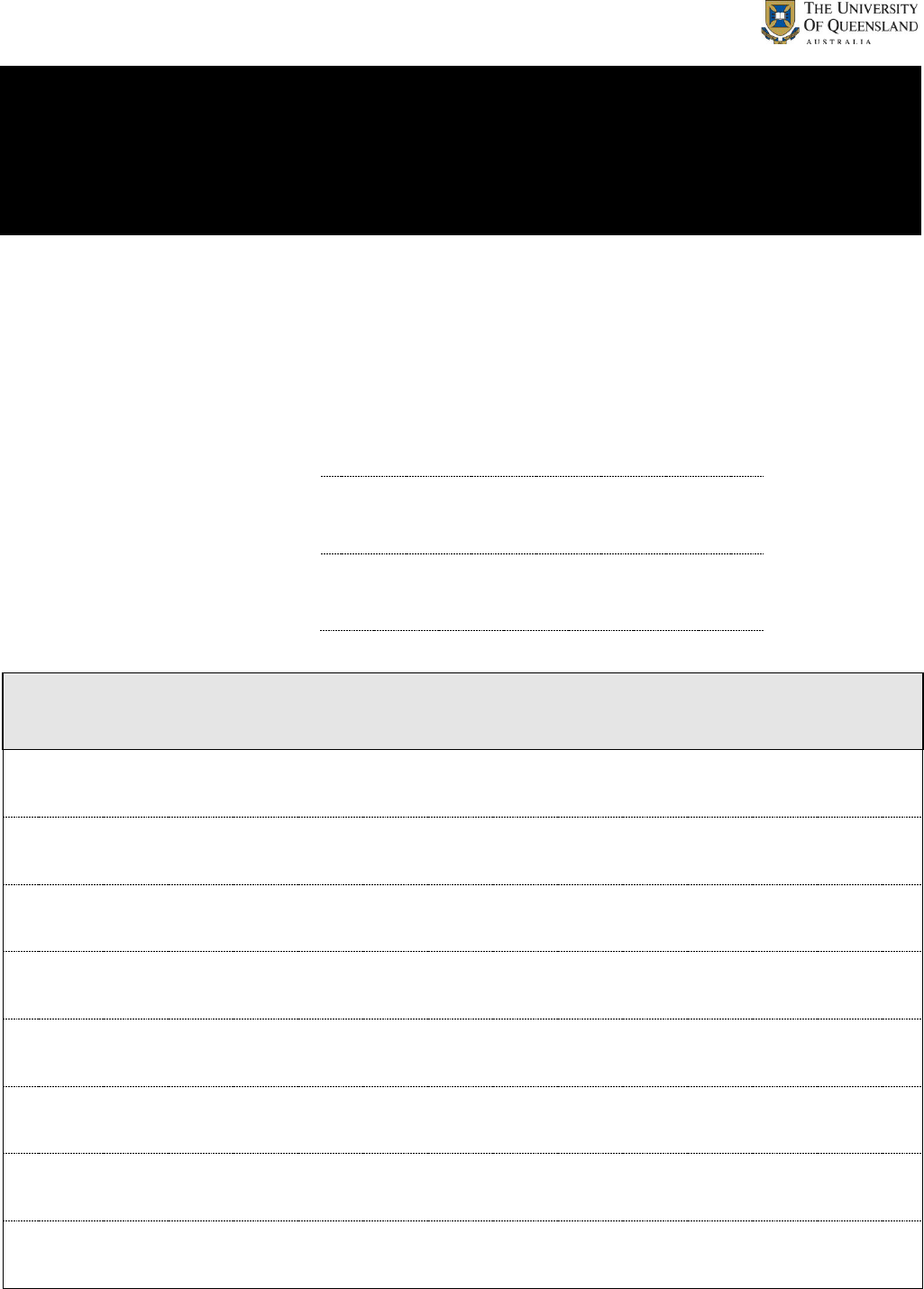
70
NOTE: Many agencies will have their own forms that are used to keep case and progress notes. (Make sure
you are familiar with any legal requirements adhered to by the agency). If not, the student may use the one
provided below to maintain his or her own records. These would remain the property of the agency on leaving
the placement and should be left on the client’s file at the time of the student completing the placement.
Client Code:
Counsellor:
Date:
Issues considered during the session
Appendix 15: Client Progress Notes
The University of Queensland Master of Counselling

71
Specific Session Goals
Activities Client to Consider Before Next Session
Suggested Directions for Next Session
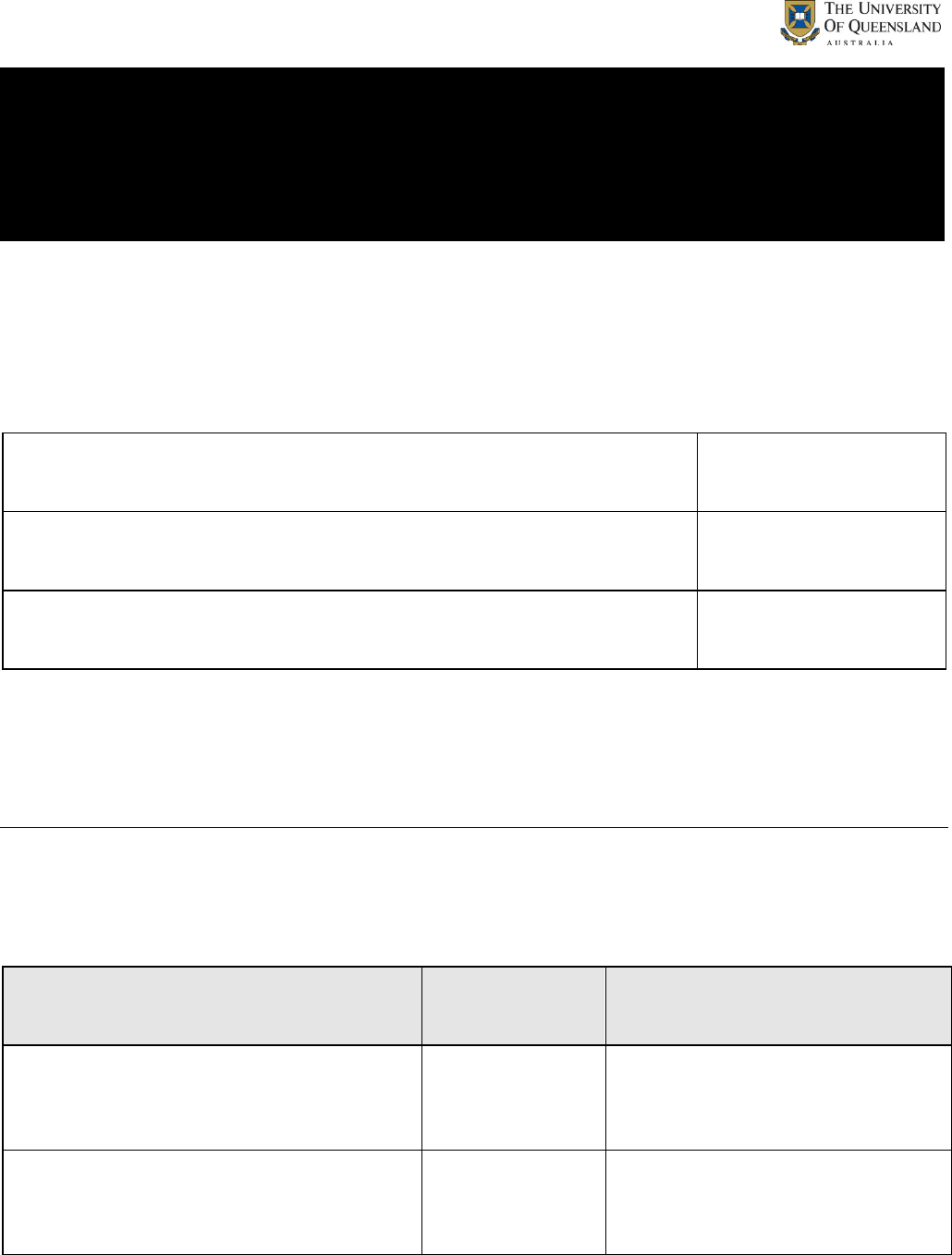
72
1. Recordings are made to enable students to observe practice and to receive feedback on their developing
skills.
2. The recordings will be viewed by the student and relevant university staff.
3. Please indicate your preference by signing your initials next to the preferred outcome:
a. The recording will be destroyed as soon as the feedback / consultation
process is complete.
b. The recording will be kept by the student who was counselling me for
further learning purposes.
c. The recording will be returned to me.
4. I understand that I have the right to request that the recording equipment be turned off at any point during the
counselling sessions and the recording destroyed/returned to me.
I hereby consent to have a recording made of my counselling sessions (as client) on the above conditions.
Name (Block Letters) Date Signature
Client
Student Counsellor
Appendix 16: Recording Consent Form
for Student Counselling Session
The University of Queensland Master of Counselling
